Ocean Carbon Lab News List
December, 2025
Huge congratulations to Fiona, Jacque, and Abby on successfully passing their proposal defenses, an important milestone in their graduate journeys!!!
December 11, 2025
It was great to welcome Thomas, a former graduate student from the Wang Carbon Lab, back to our December 2025 lab meeting. Thomas joined with his students from US-Coast Guard Academy , who presented their ongoing research aimed at better understanding the drivers of ocean acidification in the Arctic.
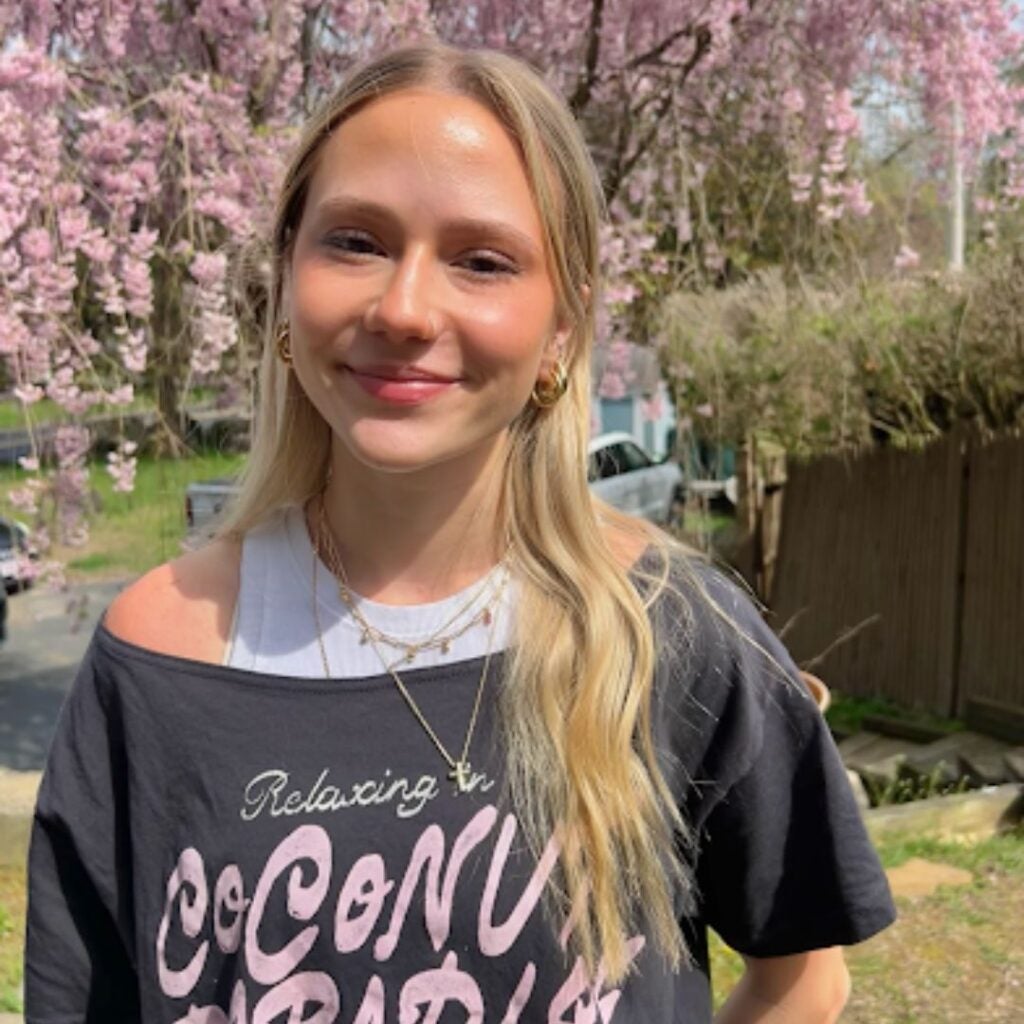
July 10, 2025
Welcome Holly Berg to the Wang lab! Holly will work with Abby Baskind to tune the Narragansett Bay Biogeochemical model, helping us develop this new tool to better understand and explore environmental conditions in Narragansett Bay.
July 9, 2025 – Congratulations to Jacque Rosa!
We are thrilled to share that Jacque Rosa has successfully led the renewal of our PRESS project for a second year of funding! This renewal marks an exciting opportunity to deepen our understanding of how environmental factors influence oyster aquaculture in Rhode Island’s coastal systems. This work will help inform both science and practice, contributing to the sustainability and resilience of shellfish farming under dynamic coastal conditions.
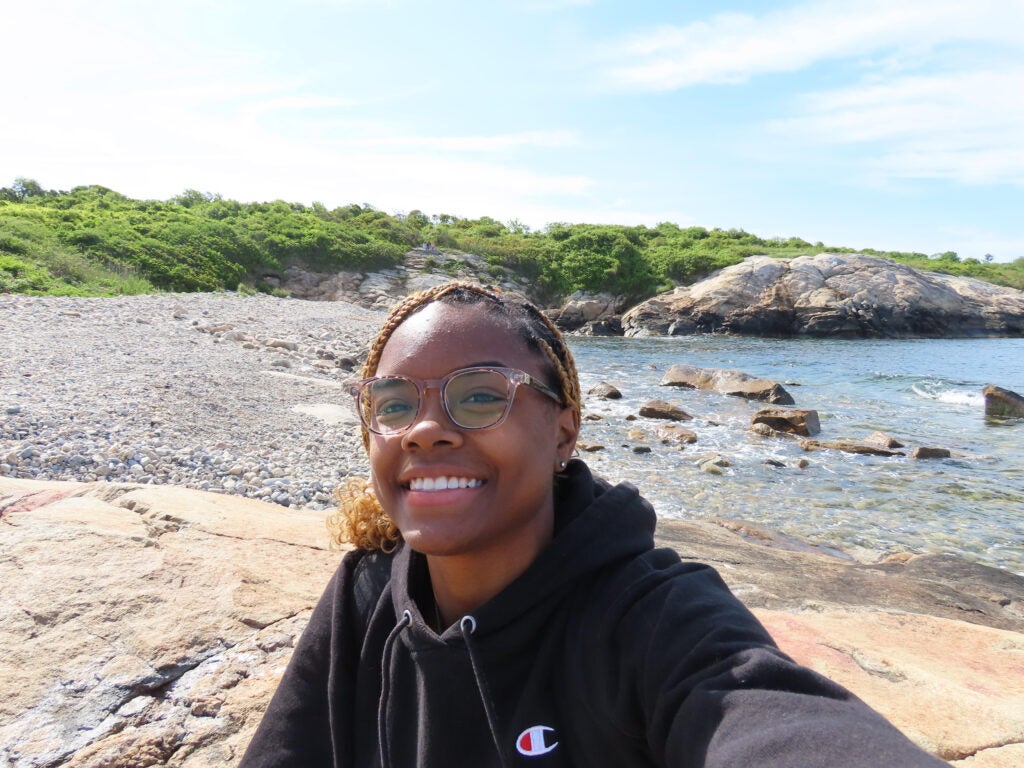
We extend our sincere thanks to the URI-PRESS team for their continued support and commitment to student-led research and collaborative coastal science.
June 2, 2025
Welcome Ms. Kaila Pruitt! Kaila, a rising senior at the illustrious Tuskegee University, has joined the Wang Lab for a summer internship to study air-sea CO₂ fluxes in Narragansett Bay. We’re excited to have her onboard!
May 25, 2025
Congratulations to PhD candidate Abby Baskind on publishing the paper analyzing the drivers of pH variability in Narragansett Bay!
- Baskind, A., Ahumada, G., Gomes, K., Stoffel, H., Gu, S., Davies, A.J., Wang, H., 2025. Unraveling natural carbonate variability in Narragansett Bay, RI using multiple high temporal resolution pH time series. Frontiers in Marine Science 12. https://doi.org/10.3389/fmars.2025.1552350
May 20, 2025
Congratulations to Wang’s Lab! Our paper, “Harnessing nature’s buffer: Assessing the role of bivalve shells in coastal alkalinity regeneration,” has just been accepted for publication in Limnology & Oceanography Letters. This study explores total alkalinity regeneration associated with oyster shells. DOI will be available shortly.
March 31, 2025
Congratulations to Fiona Teevan-Kamhawi for successfully passing their Comprehensive Exam!
March 26, 2025
Hongjie Wang visited Hamilton Elementary School to give a hands-on science lesson on water acidity and its effects on marine materials like shells. The students learned about how acidic environments can affect calcium carbonate structures—just like what happens in ocean acidification.
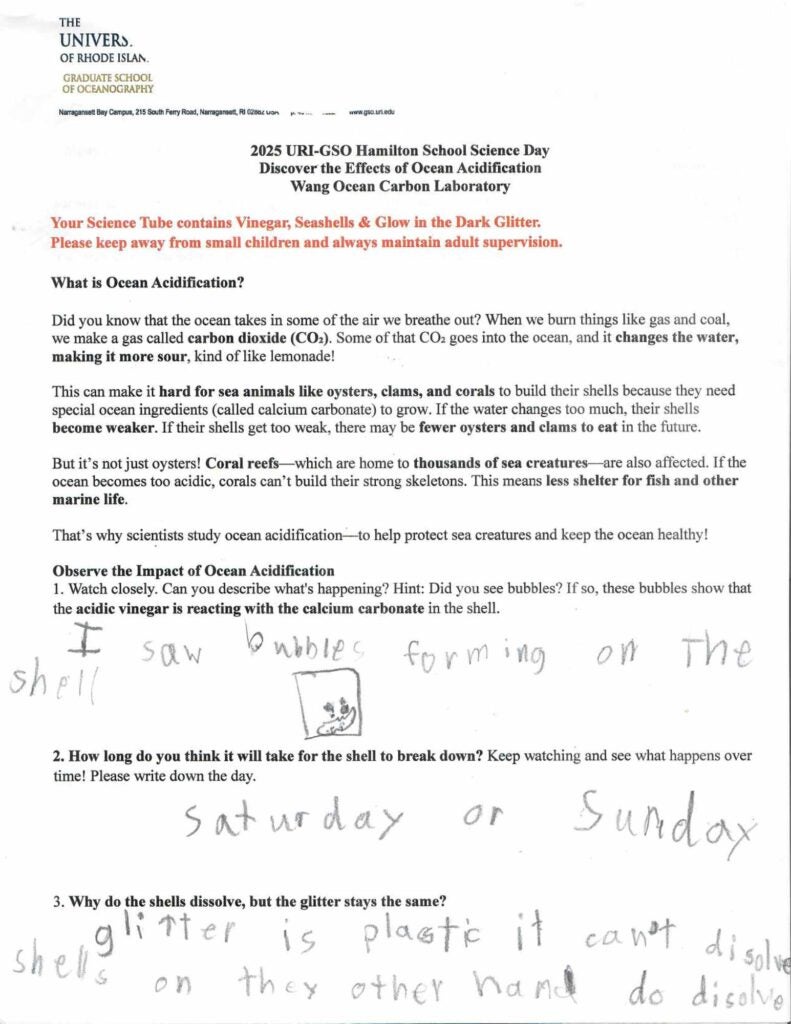
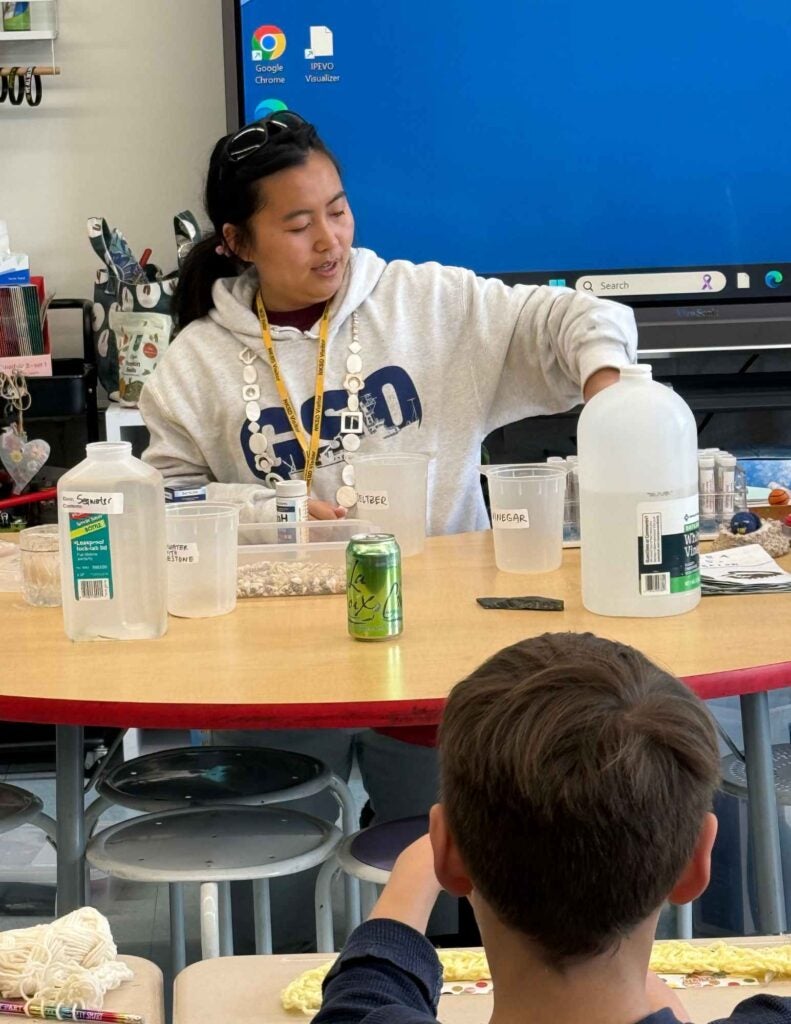
February 18, 2025
Kudos to Wang Ocean Carbon Lab alumnus Thomas Caero! His work, “Pacific-Arctic Ocean Acidification: Decadal Trends and Drivers,” has been accepted for publication in Global Biogeochemical Cycles.
February 17, 2025
Congratulations to Abby Baskind for successfully passing their Comprehensive Exam!
January 21, 2025
Welcome Dr. Teresa Schwemmer to the Wang Ocean Carbon Lab! We’re thrilled to have you on board and look forward to working with you on the Coastal liming project in Winnapaug Pond!
Our first field trip of 2025 to Winnapaug Pond! It was a chilly day, but the sun was shining, and birds were flying around us. I wish I had pictures to capture the moment—just imagine a beautiful sunny day with birds soaring in the crisp winter air.
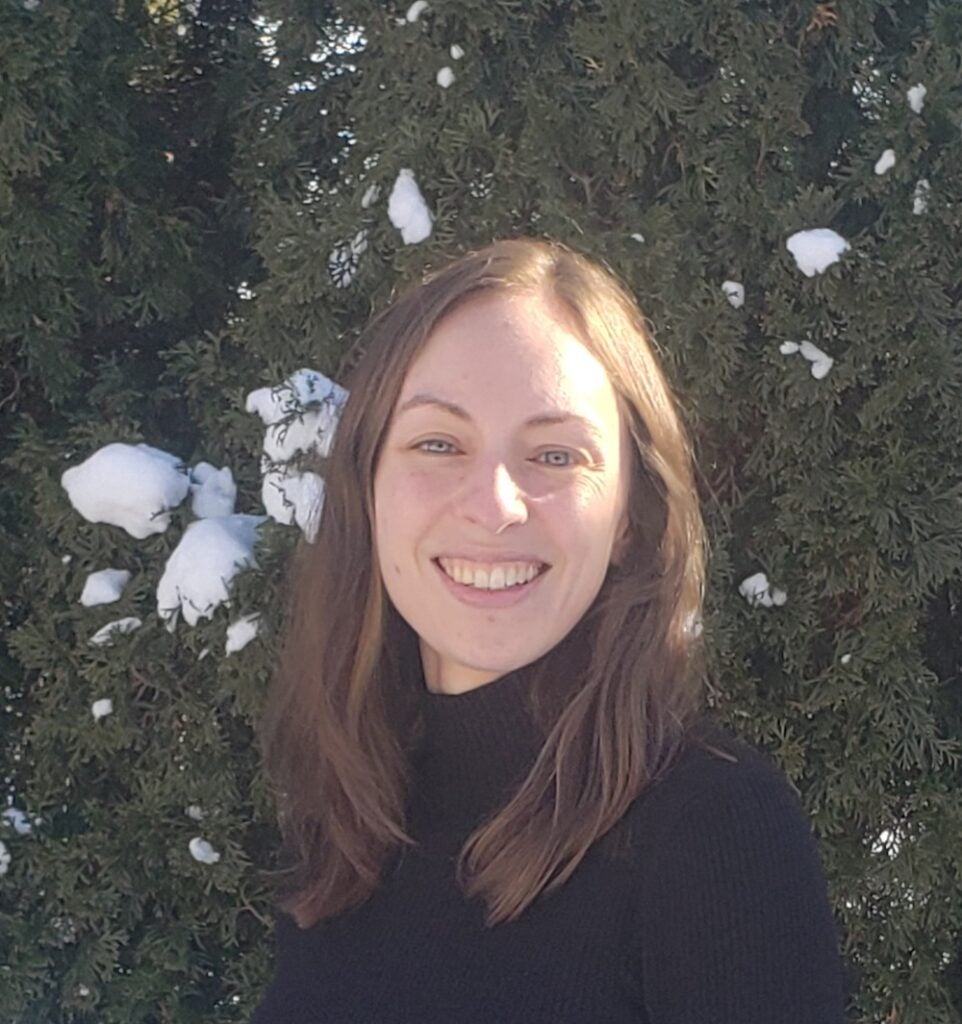
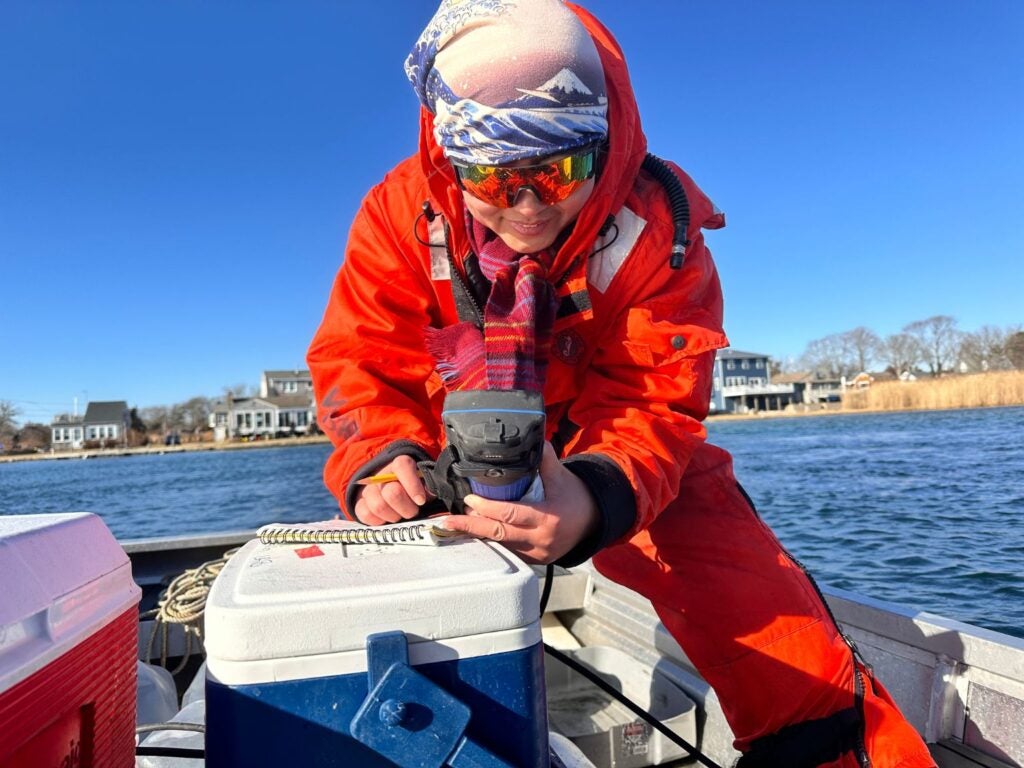
December 4, 2024
Hongjie Wang and her OCG588 Carbon Dioxide Removal class recently visited Vycarb, a pioneering ocean alkalinity enhancement (OAE) startup. The visit provided students with an invaluable opportunity to learn about OAE for combating climate change by enhancing the ocean’s capacity to absorb carbon dioxide. The class toured Vycarb’s facilities and field site, where minerals are being added to the East River as part of an experimental project.
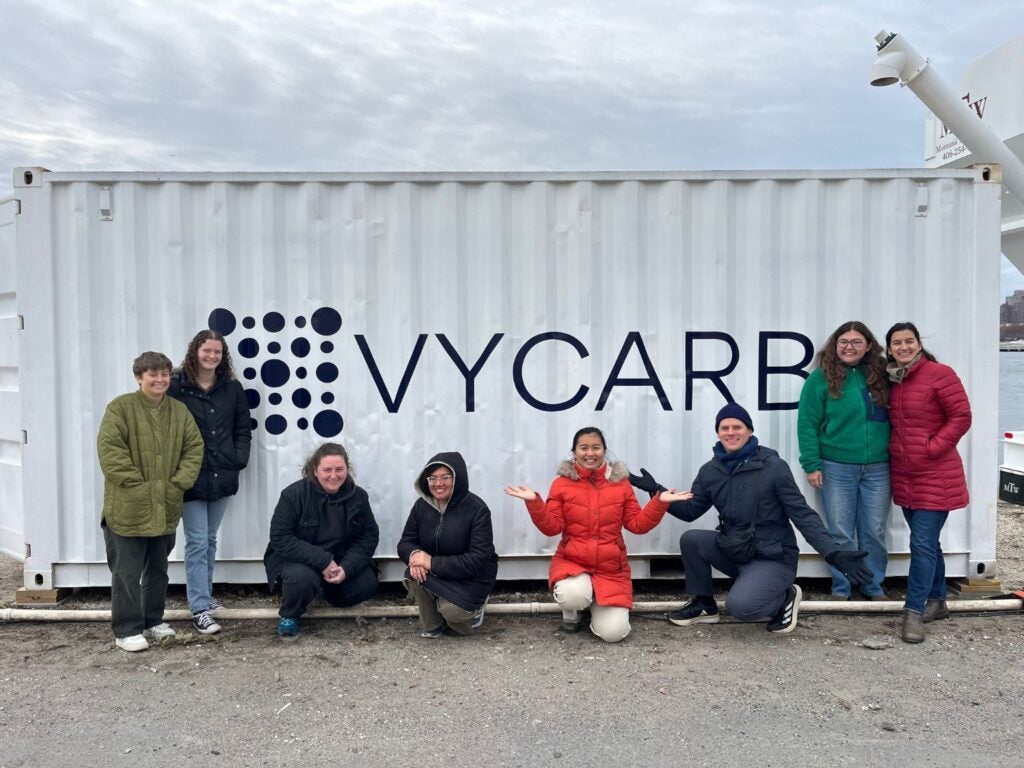
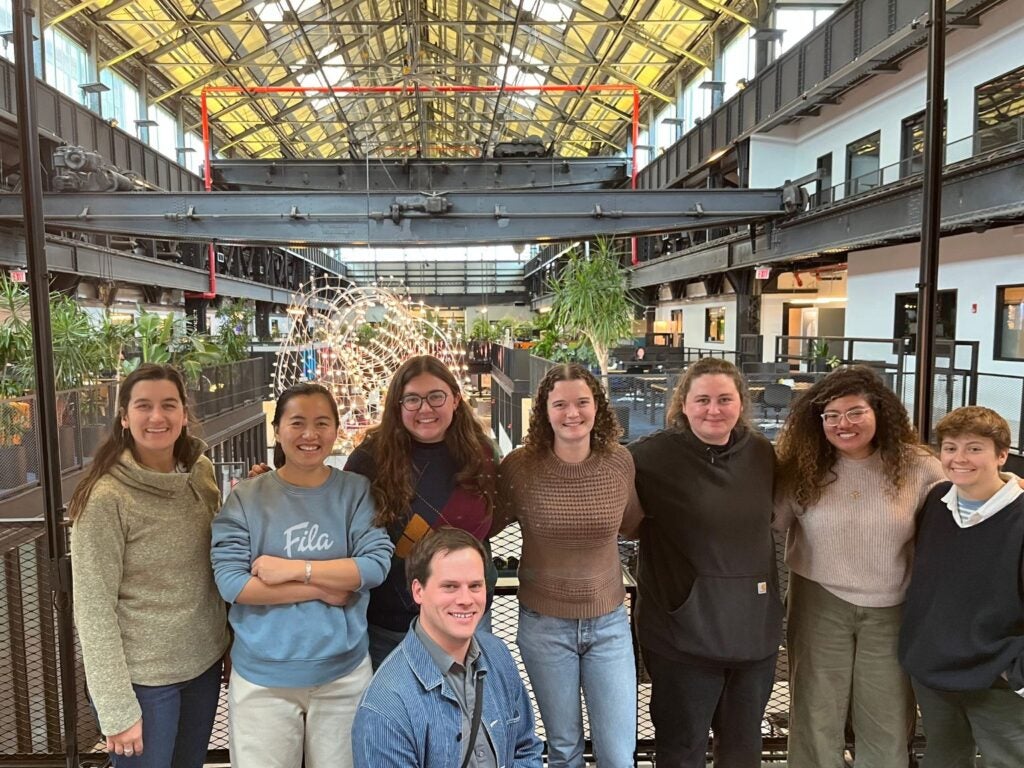
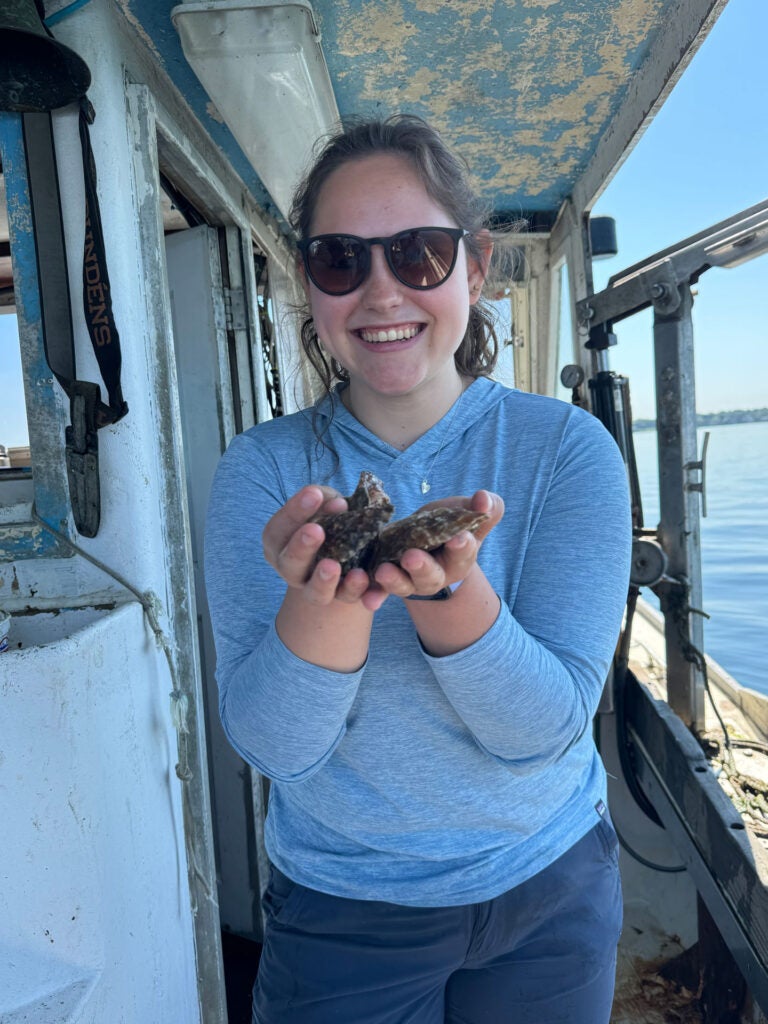
November 30, 2024
Hongjie Wang gave a talk titled “Carbon Dioxide Removal: Opportunities, Hurdles, and the Global Climate Imperative” at the 20th Chinese-American Kavli Frontiers of Science Symposium.
June 2, 2024
Welcome to our SURFO student Ms. Ilana Jacobs!
May 17, 2024
Deploying Buoys for Oyster Farm Research!
With the support of Cathy Cipolla and Gary Savoie, Fiona and Hongjie successfully deployed two buoys near the Wickford Oyster Farm to monitor the water chemistry, which may potentially impact oyster performance.
These buoys are ready to be deployed to collect Temperature, Salinity, Dissolved Oxygen, pH and CHL funded by the PRESS Project (Partnership for Research Excellence in Sustainable Seafood (PRESS))!
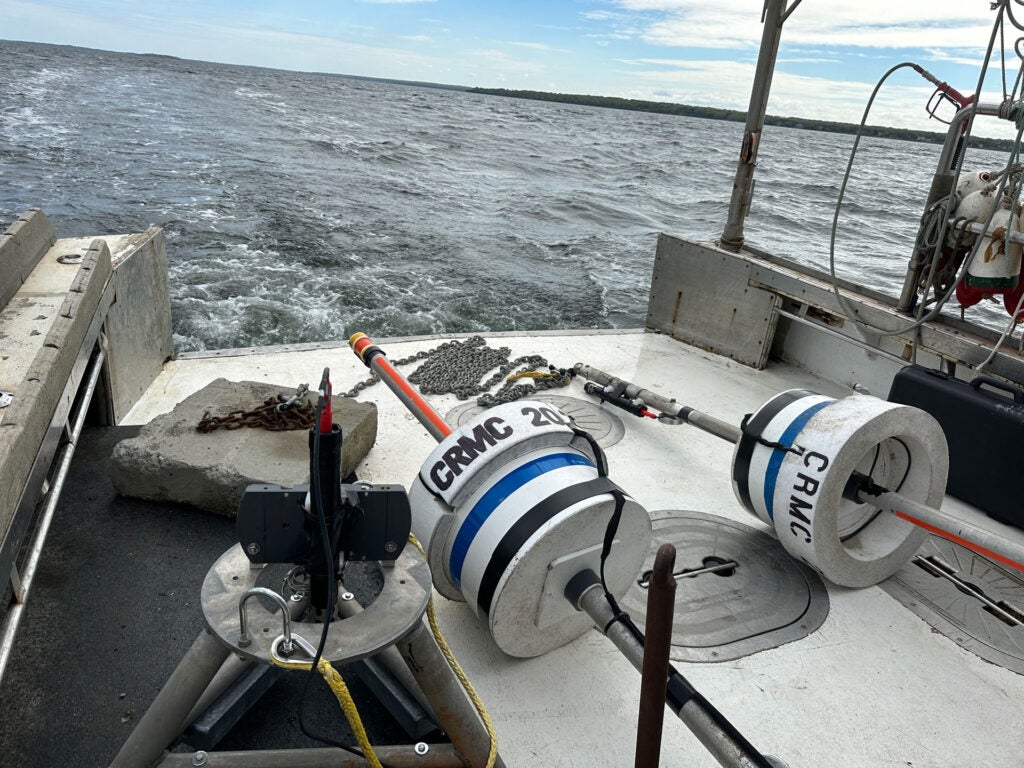
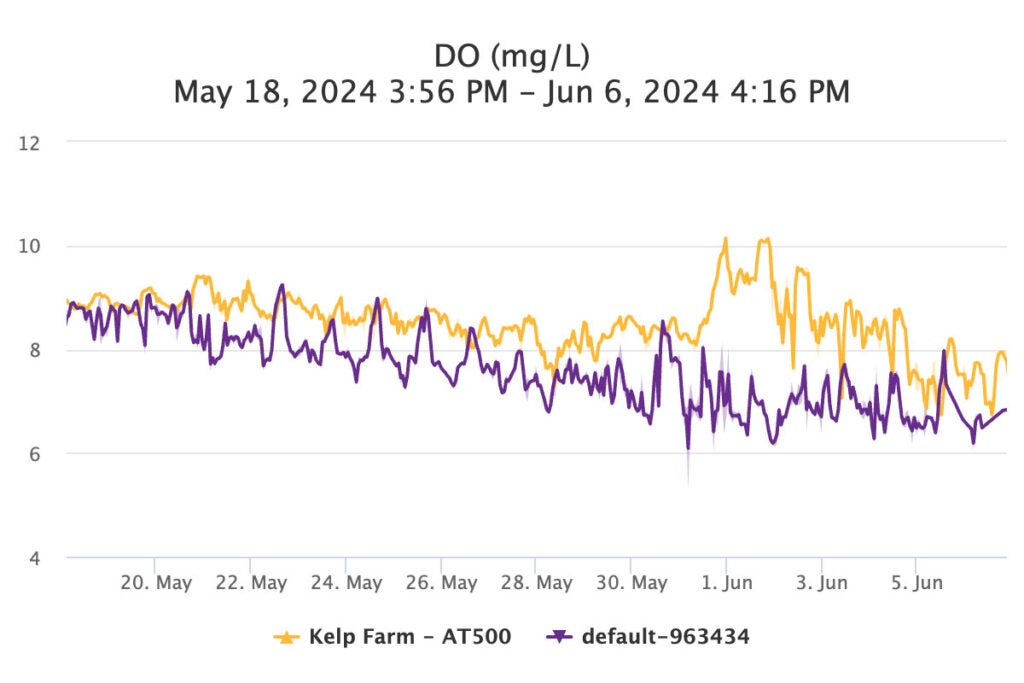
May 6, 2024
I am pleased to announce that the manuscript of “Effect of Nutrient Reductions on Dissolved Oxygen and pH: A Case Study of Narragansett Bay ” DOI: 10.3389/fmars.2024.1374873 has been accepted for publication in Frontiers in Marine Science, section Marine Biogeochemistry.
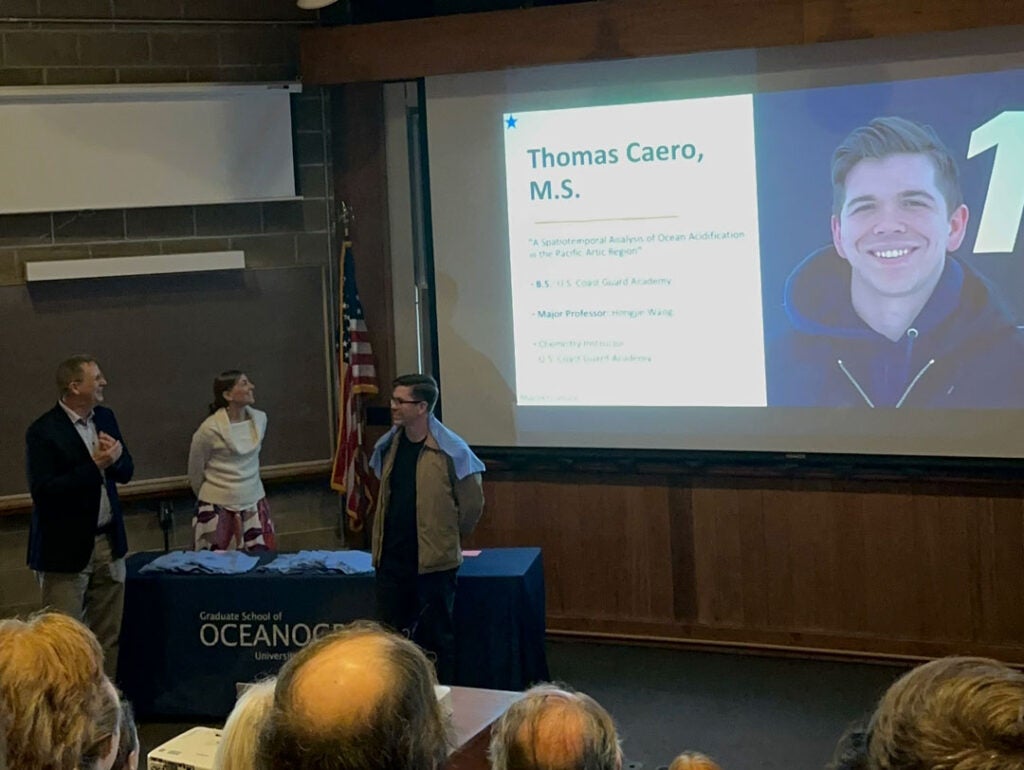
May 17, 2024
Congratulations to our newest alumni, Thomas Caero!
Thomas is receiving his GSO shirt during the 37th annual GSO shirting ceremony. Thomas successfully defended his master’s thesis titled “Pacific-Arctic Ocean Acidification: Decadal Trends and Drivers” on March 28, 2024.
March 29, 2024
Congratulations to Thomas Caero for successfully defending his master’s thesis: “A Spatiotemporal Analysis of Ocean Acidification in the Pacific-Arctic Region” today! Well done on this outstanding achievement, Thomas!
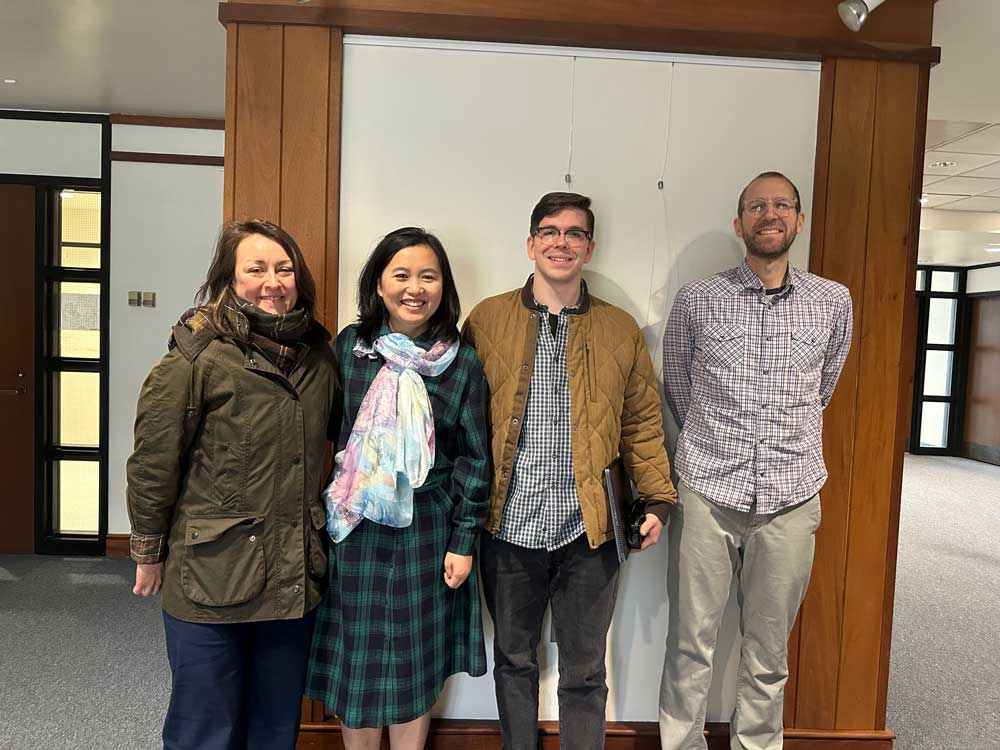
January 31, 2024
Thomas captivated the audience with his thesis presentation at Alaska Marine Science Symposium (AMSS2024): “Ocean acidification in the Pacific-Arctic Region: Bridging carbonate system observational gaps”. His study confirmed that faster sea ice loss is the speeding up the ocean acidification in the Arctic regions.
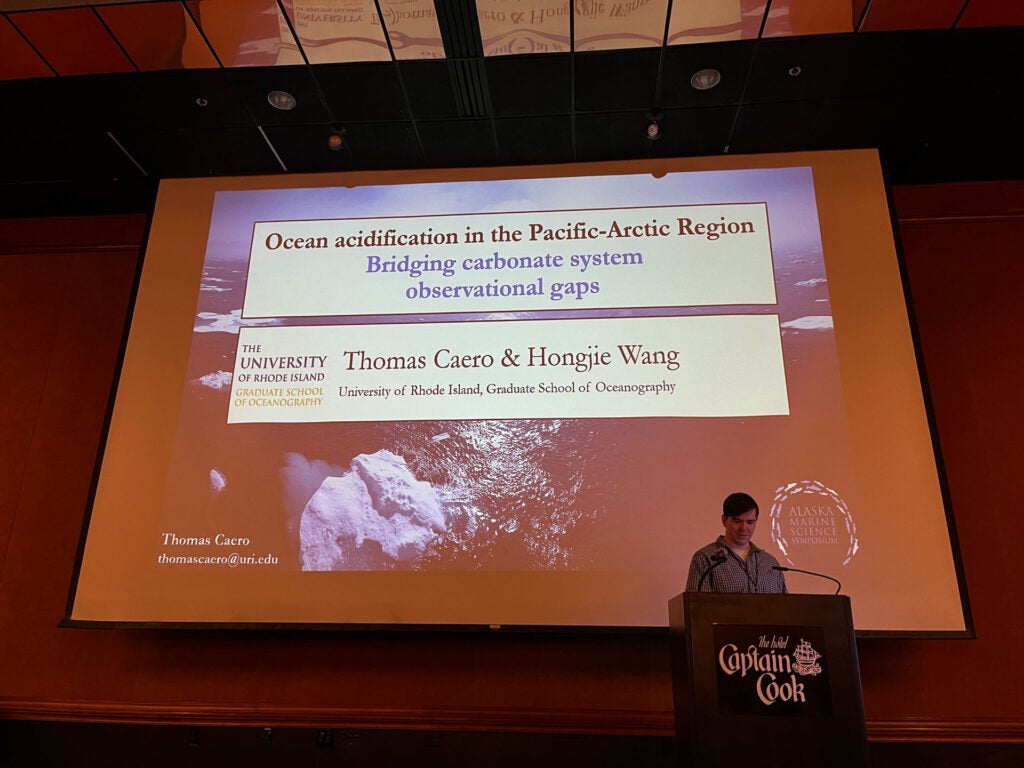
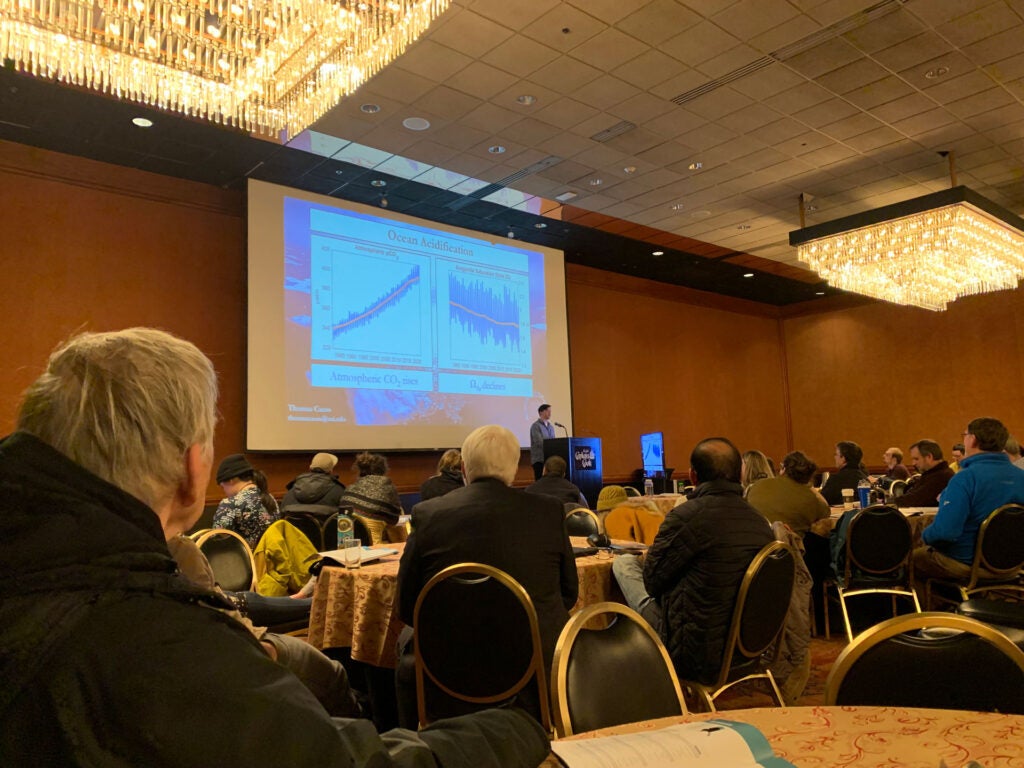
December 12, 2023
Abby, with the support of Georgia, delivered an talk on “Unraveling Natural Carbonate Variability in Narragansett Bay, RI Using Multiple High Temporal Resolution pH Time Series”. Their findings uncovers that biological processes are the dominated process shaping the pH levels in Narragansett Bay on a short-term scale.
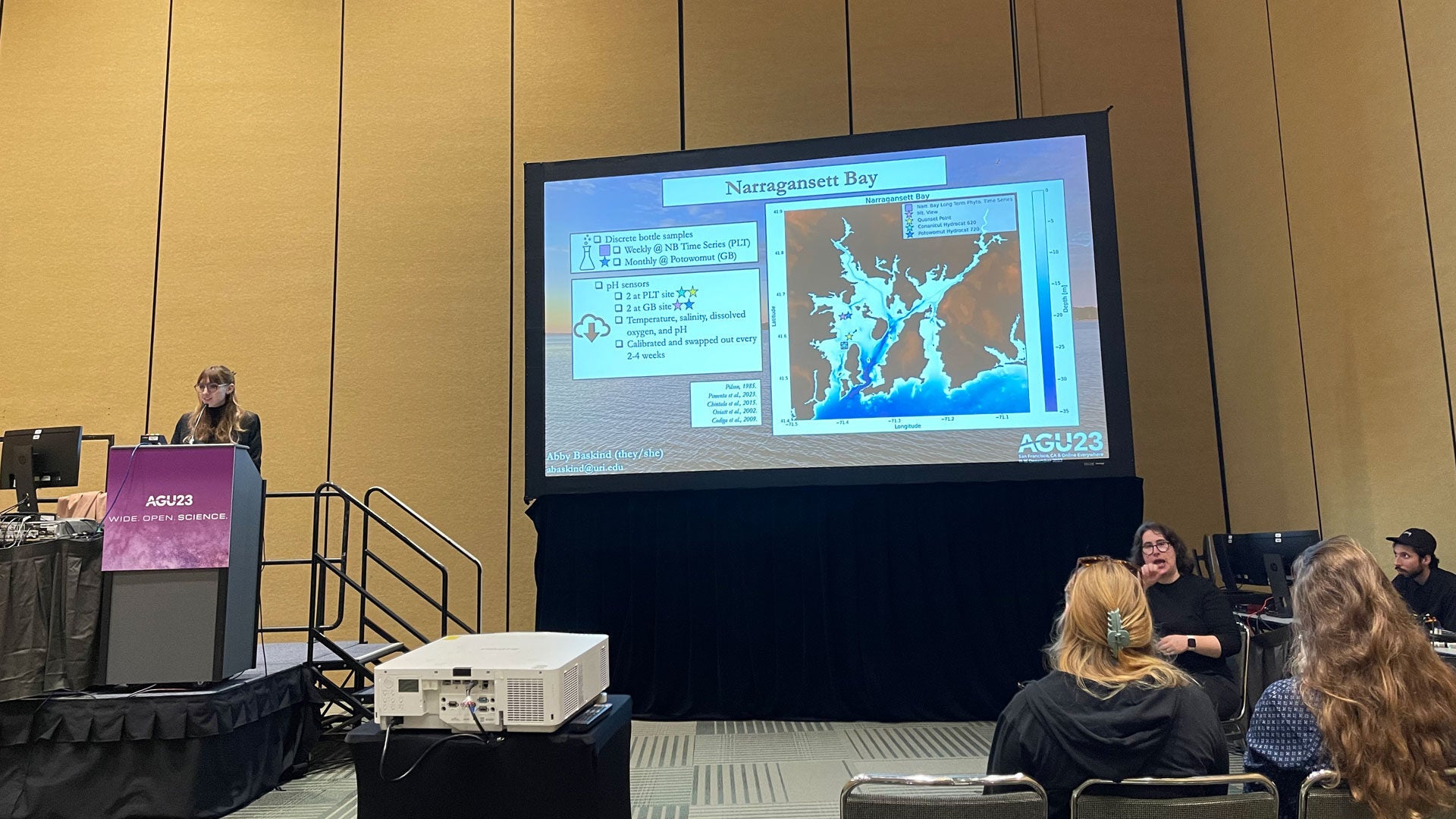
December 11, 2023
Fiona shared the promising and limitation of Macroalgae Cultivation in mitigate ocean acidification. Her research offers a glimmer of hope, suggesting that macroalgae cultivation can only temporarily enhance local pH levels.
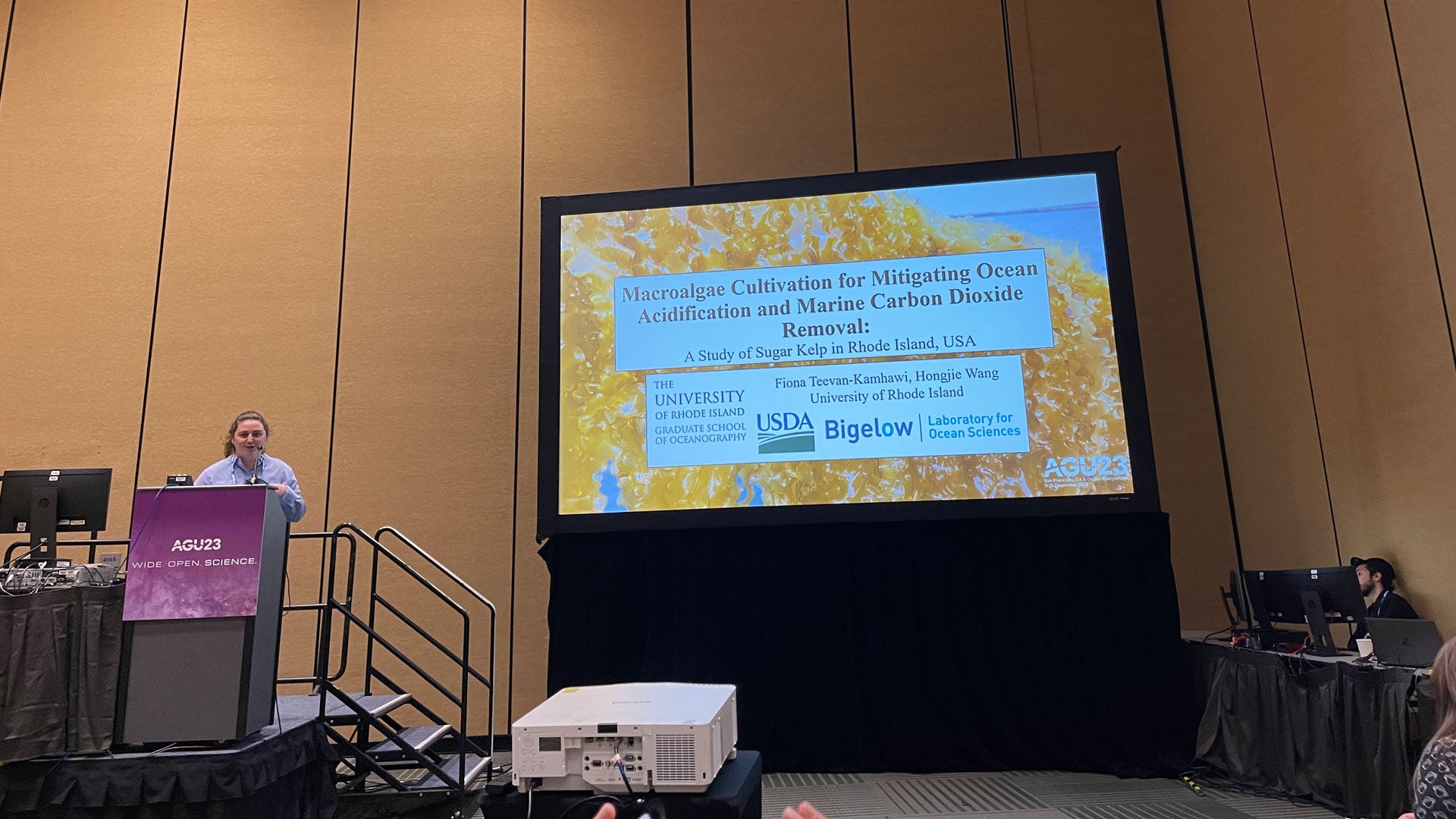
December 11, 2023
Olivia, in collaboration with Fiona, shared her SURFO project findings on “Harnessing Nature’s Buffer: Assessing Oyster Shell Dissolution for Ocean Acidification Mitigation and Ocean Alkalinity Enhancement”. Their 140-day incubation study reveals the potential of oyster shells in combatting ocean acidification and urging a re-think of oyster shell disposal laws.
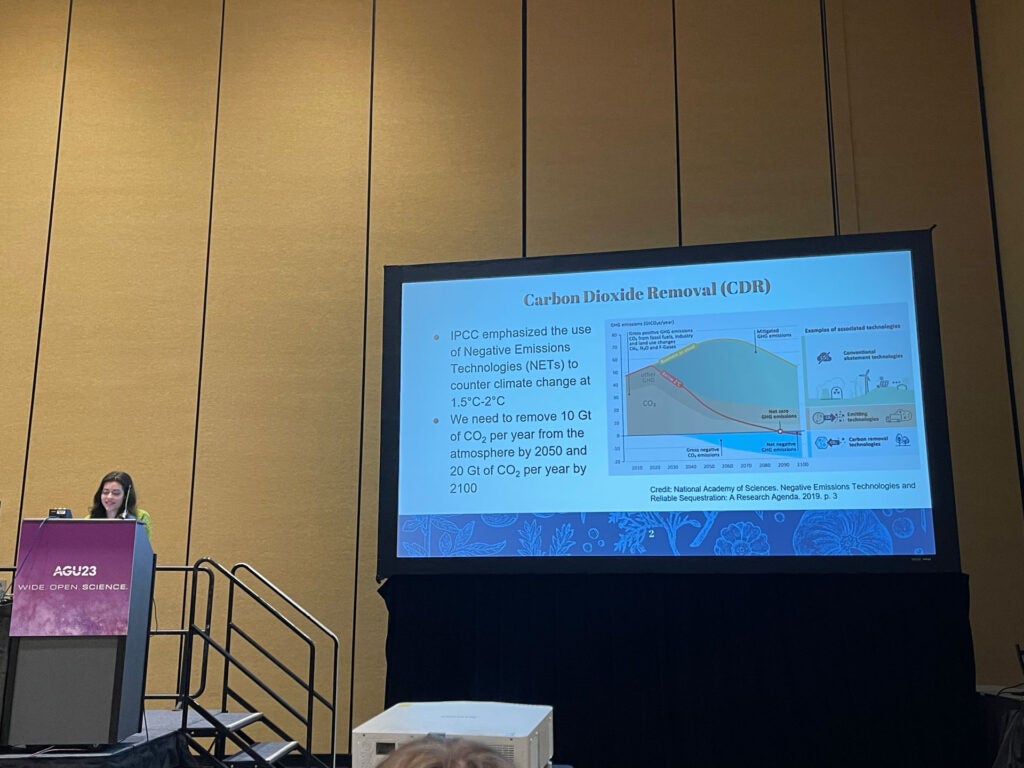
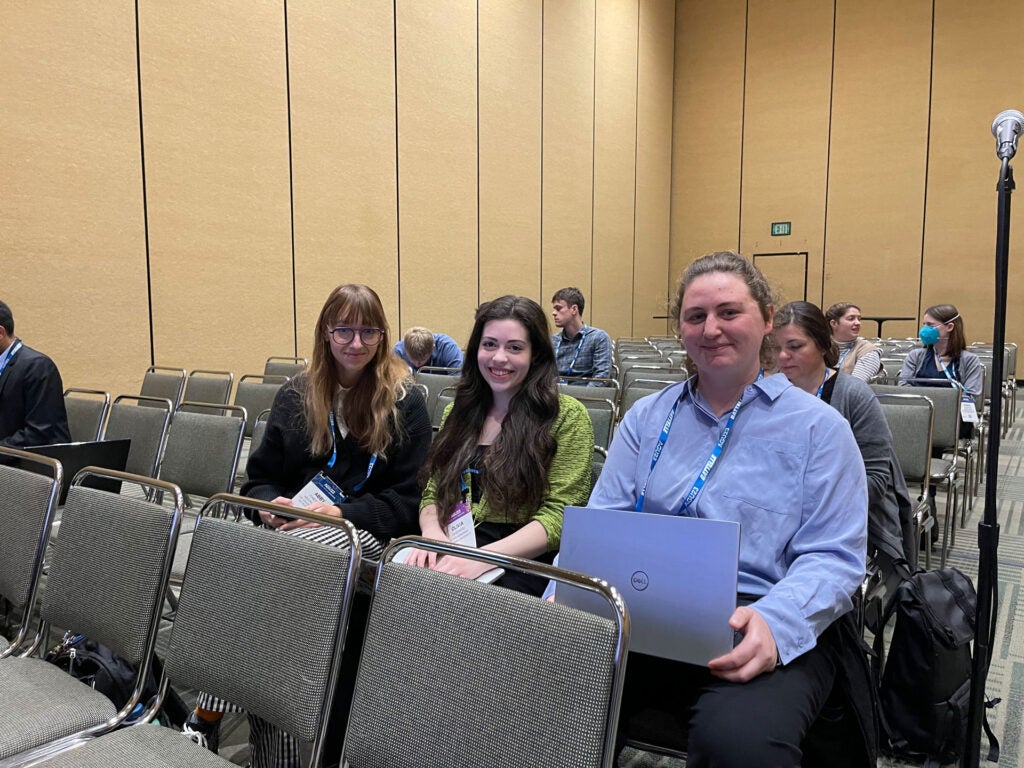
August 16, 2023
A heartfelt appreciation goes to Kris Gomes, Andy Davies, and the generous NSF funding agency. Owing to their unwavering support, we’re thrilled to access real-time seapHOx data from Narragansett Bay. Keep an eye out, as there’s more sensor deployment lined up this Fall!
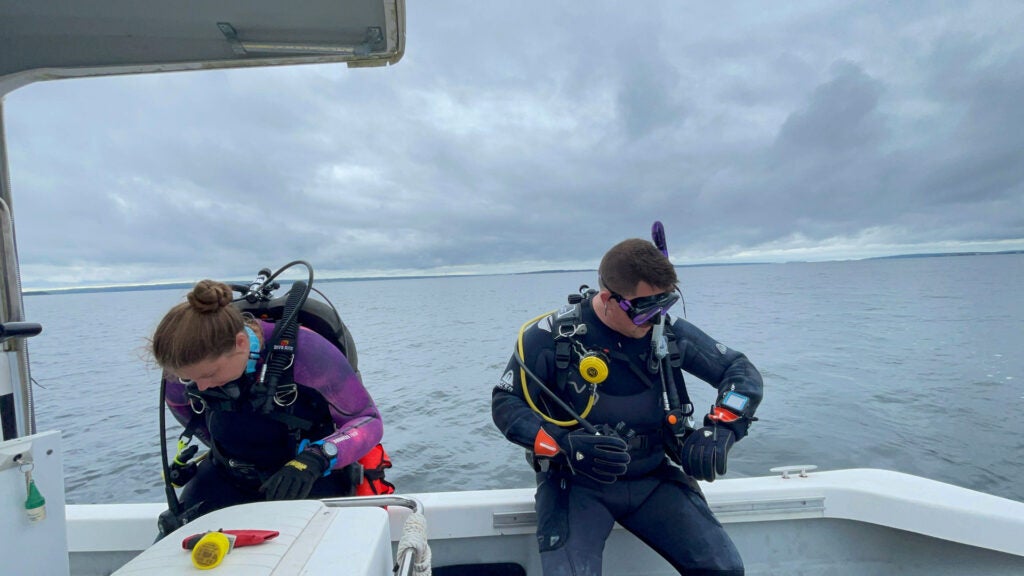
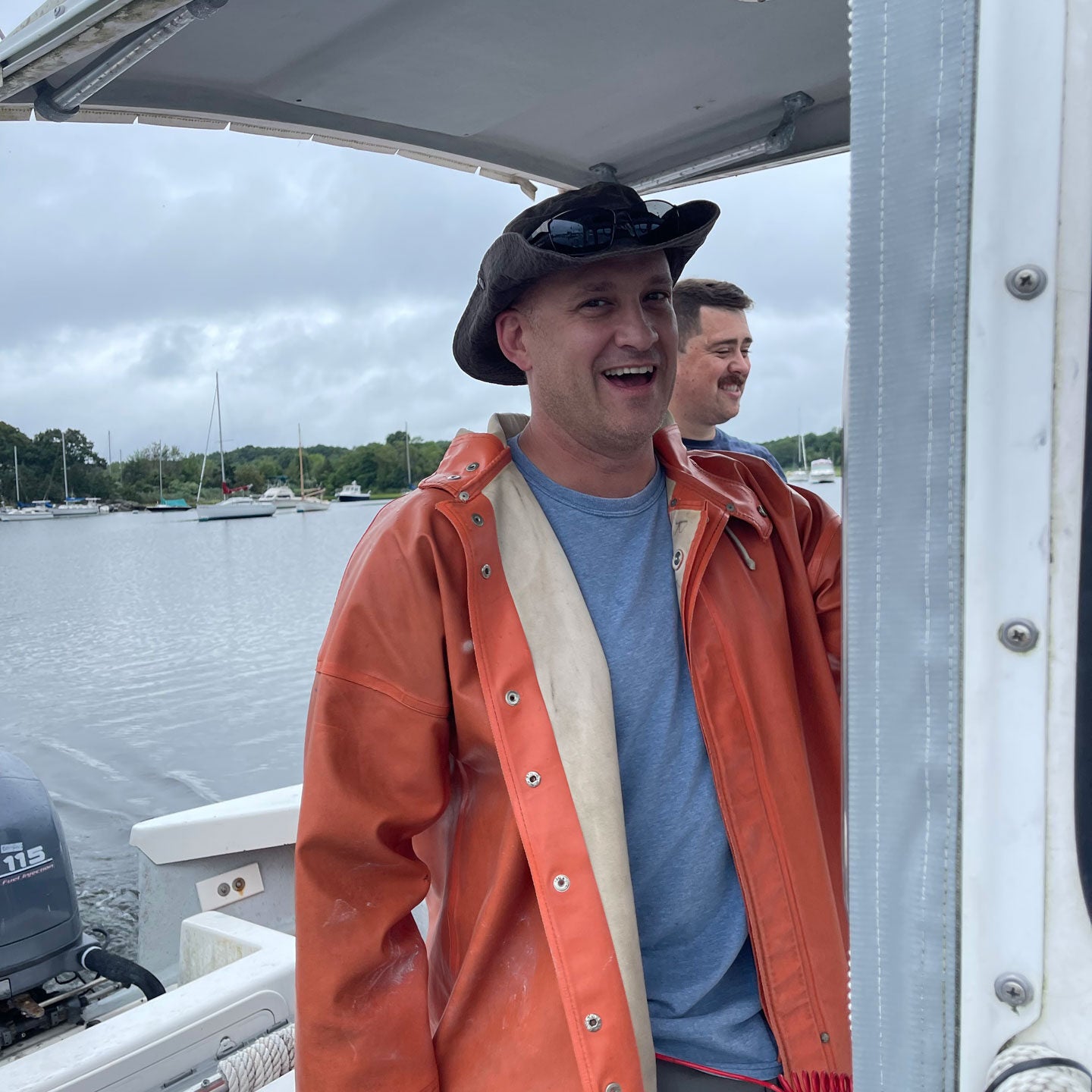
August 10, 2023
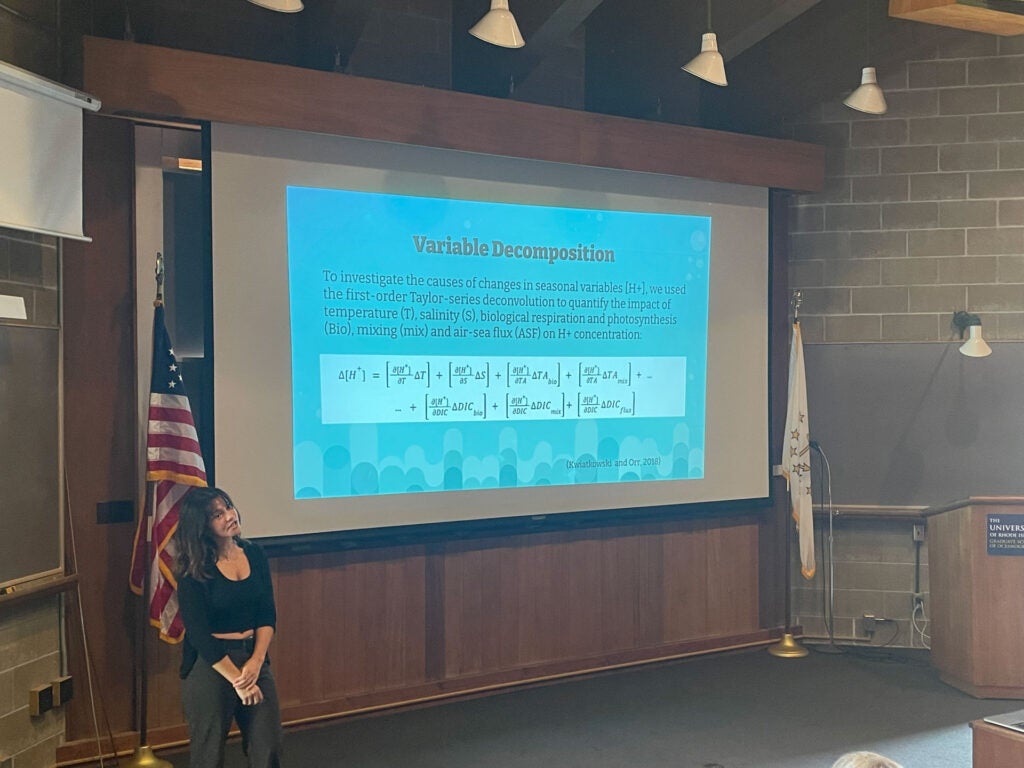
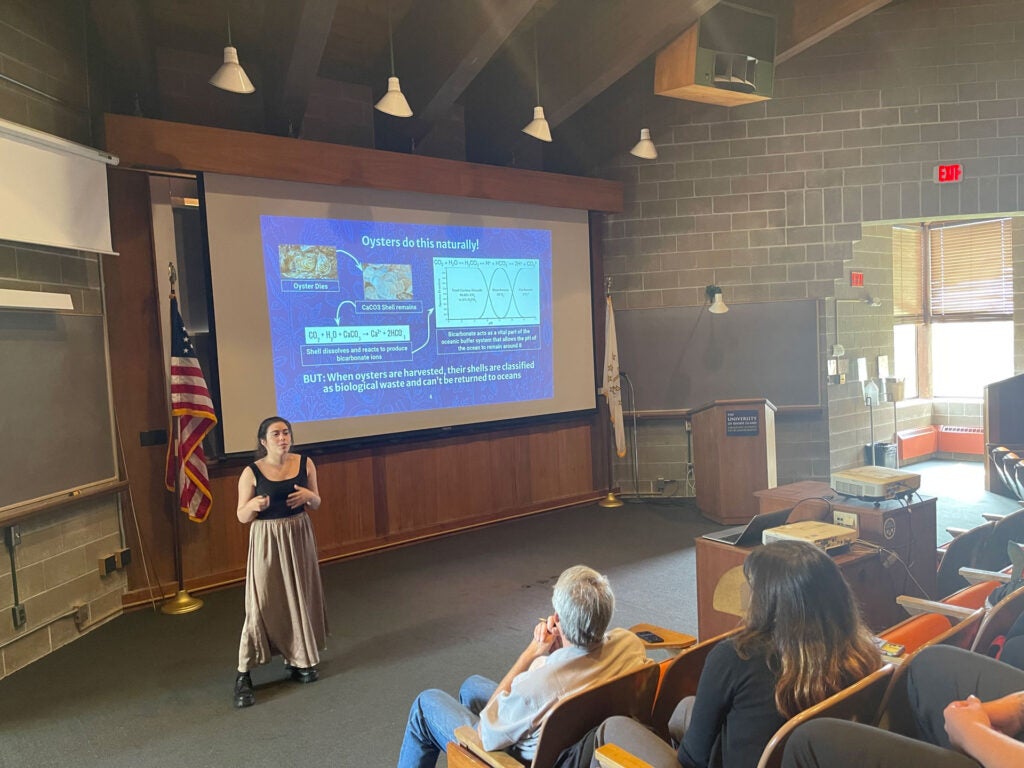
Hearty congratulations to our SURFO student, Georgia Ahumada! Collaborating with her student mentor, Abby Baskind, Georgia delved into intricate pH data collected from January 2022 onwards from both the northern and southern regions of Narragansett Bay. Their rigorous analysis quantified the varying contributions of different pH drivers, revealing that biological production predominantly influences pH changes across diverse timescales, from daily to annually. Explore more about their findings at AGU2023!
Hats off to another brilliant SURFO student, Olivia Rebernik! Under the expert guidance of her student mentor, Fiona Teevan-Kamhawi, Olivia embarked on an enlightening summer experiment, delving into the Oyster Shell Dissolution rate using authentic Narragansett Bay water. They observed significant shell dissolution across all seawater treatments. This research brings to light the substantial benefits of reintroducing oyster shells to coastal regions. To delve deeper, catch their detailed discussions at AGU2023!
July 19, 2023
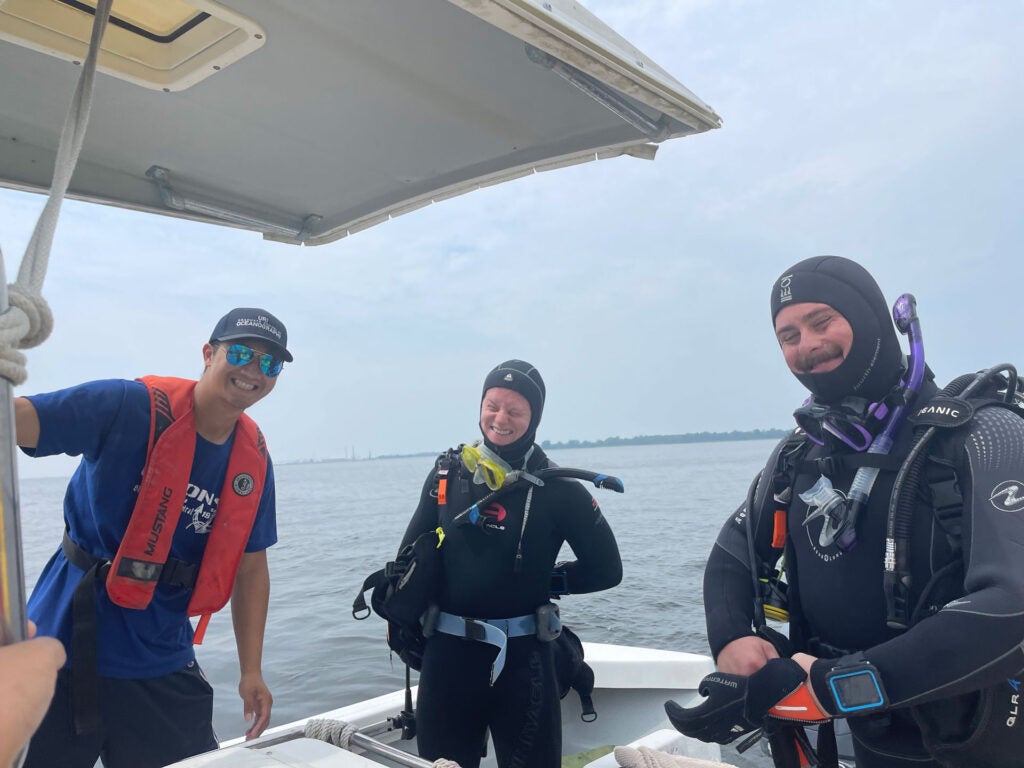
Exciting developments! We’ve successfully recovered the second SAMICO2 from Greenwich Bay. An initial review of the SAMICO2 data paints an optimistic picture, although the most recent month shows signs of biofouling interference.

June 13, 2023
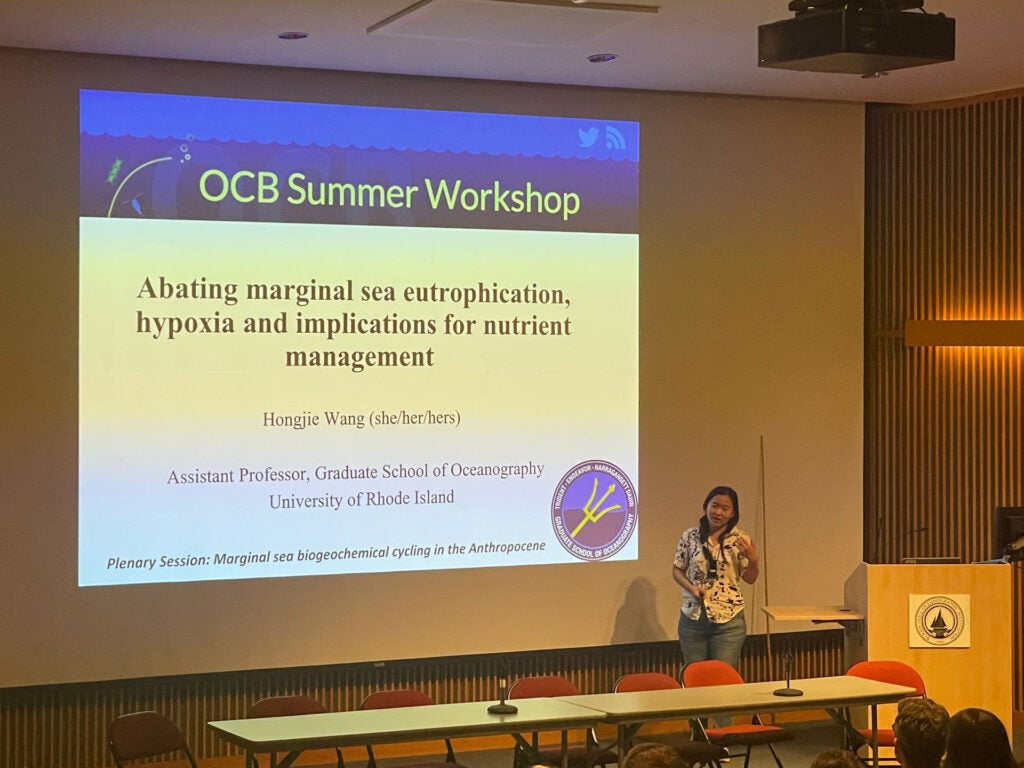
Hongjie gave an invited talk at OCB 2023 summer workshop titled as “Abating marginal sea eutrophication, hypoxia and implications for nutrient management”.
June 12, 2023
Fiona’s poster became a big hit at the OCB 2023 poster session! The poster, based on over five months of close observation, presented the potential of kelp in mitigating ocean acidification at a local scale. Essentially, kelp can provide a more buffered pH environment – a form of shelter – to marine organisms. However, it was observed that the impacts quickly diminished after the kelp were harvested.
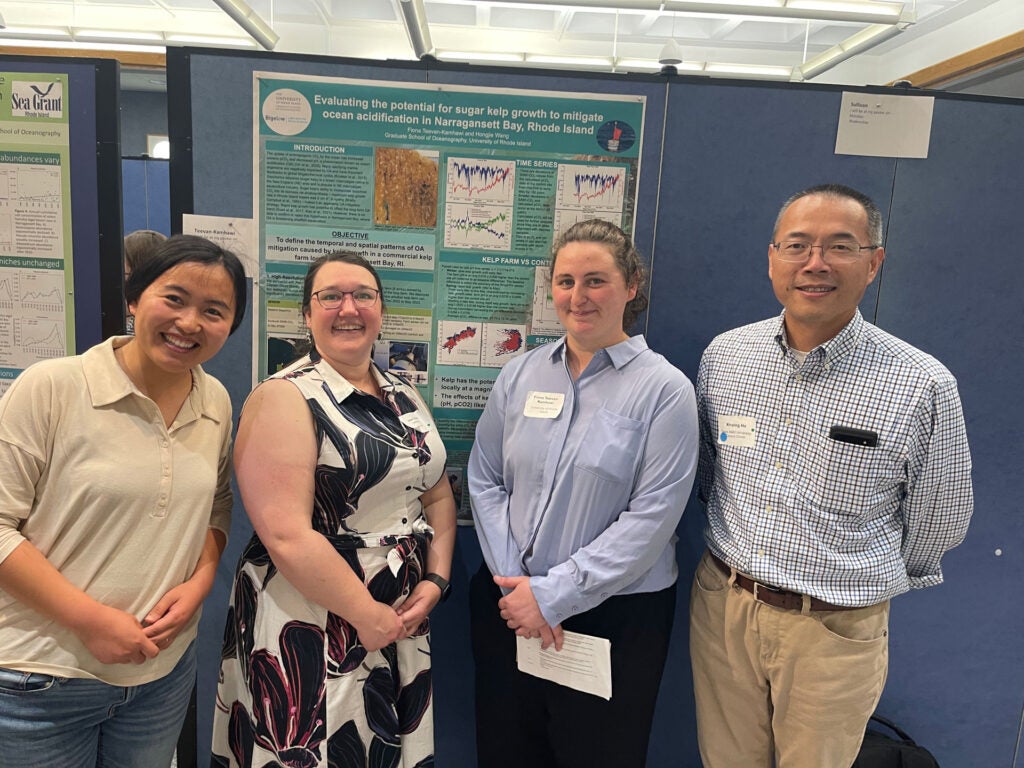
May 26, 2023
Dr. Linquan Mu, a former Postdoc from URI-GSO, published “Considerations for hypothetical carbon dioxide removal via alkalinity addition in the Amazon River watershed” in Biogeosciences, https://doi.org/10.5194/bg-20-1963-2023.
May 3, 2023
Fiona, Hongjie, and Captain Blaney wrap up the kelp project monitoring work. We look forward to presenting the results of this project at the OCB2023 summer workshop!
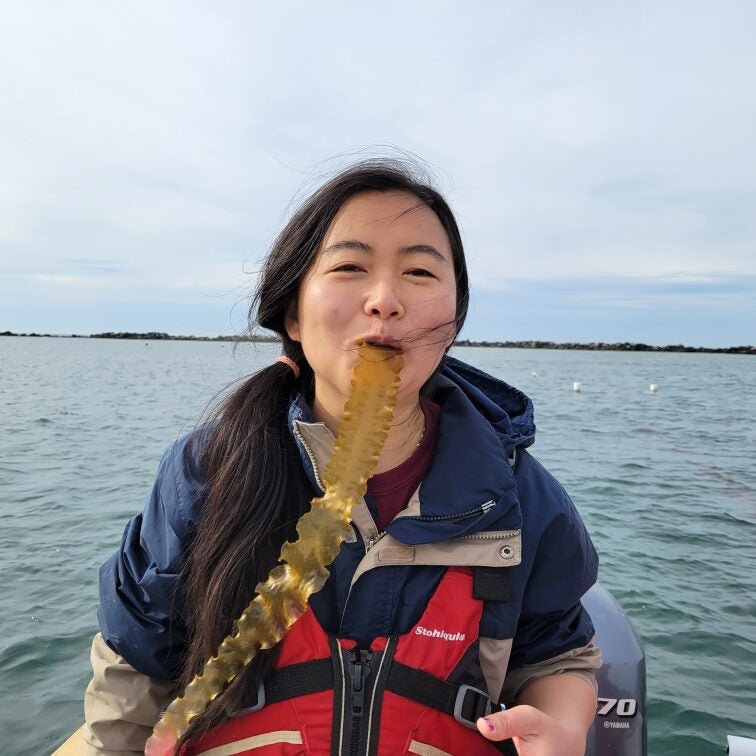
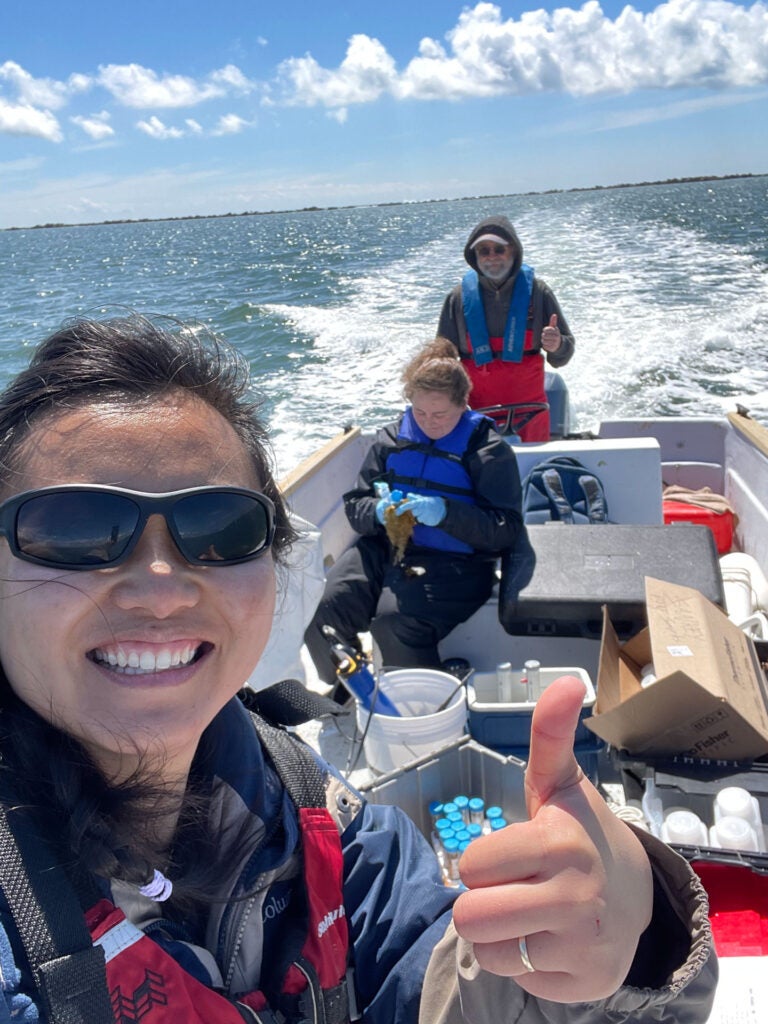
March 22, 2023
Anya Hanson, Ruby Dener, and Kristofer Gomes recovered the SAMICO2 sensor that was deployed back in September 2022! Outstanding work!
March 1, 2023
The weather has become more pleasant in Rhode Island, and the Kelp grew very fast because of the climbing water temperature. Here is one picture taken by Justin Sankey showing Hongjie and Fiona working on recalibrating the sensors in the Point Judith kelp Farm.
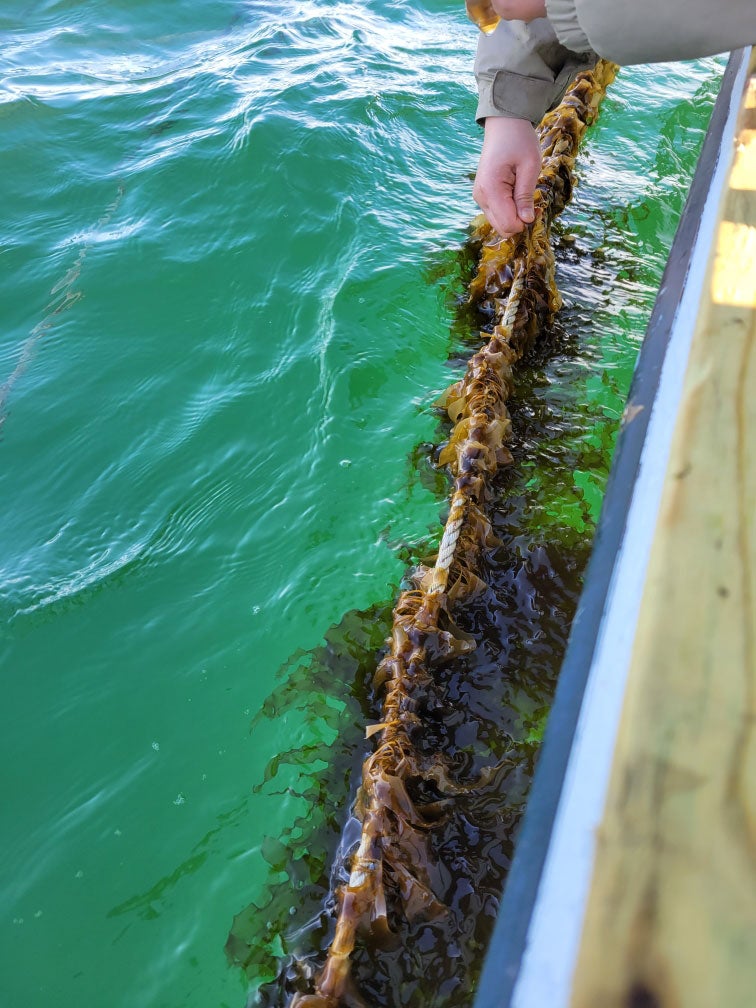
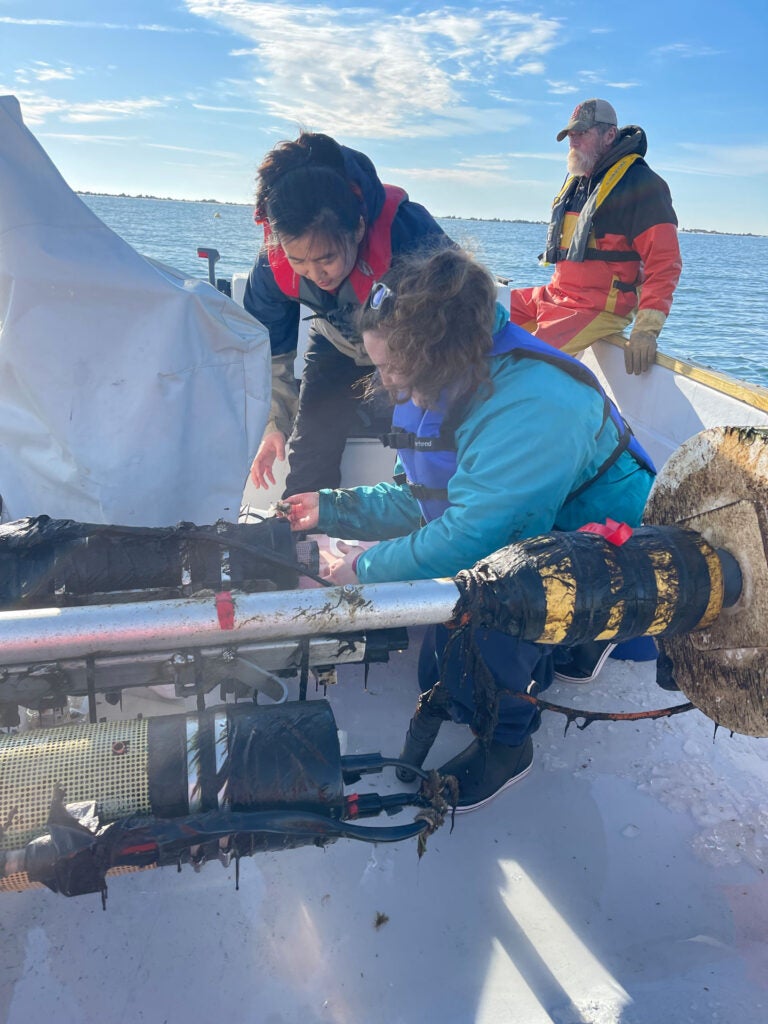
Feb 27, 2023
Congratulations to Hongjie Wang, Andrew Davis, Dave Ullman, and Jason Grear from EPA. Their proposal titled “ Drivers of ocean acidification in a temperate urbanized estuary undergoing nutrient loading reductions” is awarded by NSF-Chemical Oceanography (06/01/2023 ~05/31/2026). This project will leverage the existing water quality monitoring network, collect new data, and utilize a coastal biogeochemical model to quantify the variability of OA and the mechanisms driving its change in Narragansett Bay. Ph.D. student Abby Baskind from Wang lab will lead the integration of the OA module into the biogeochemical model. Through engagement with public and local shellfish growers, we will increase their awareness of OA and enhance their ability to site new aquaculture operations in the near and long term.
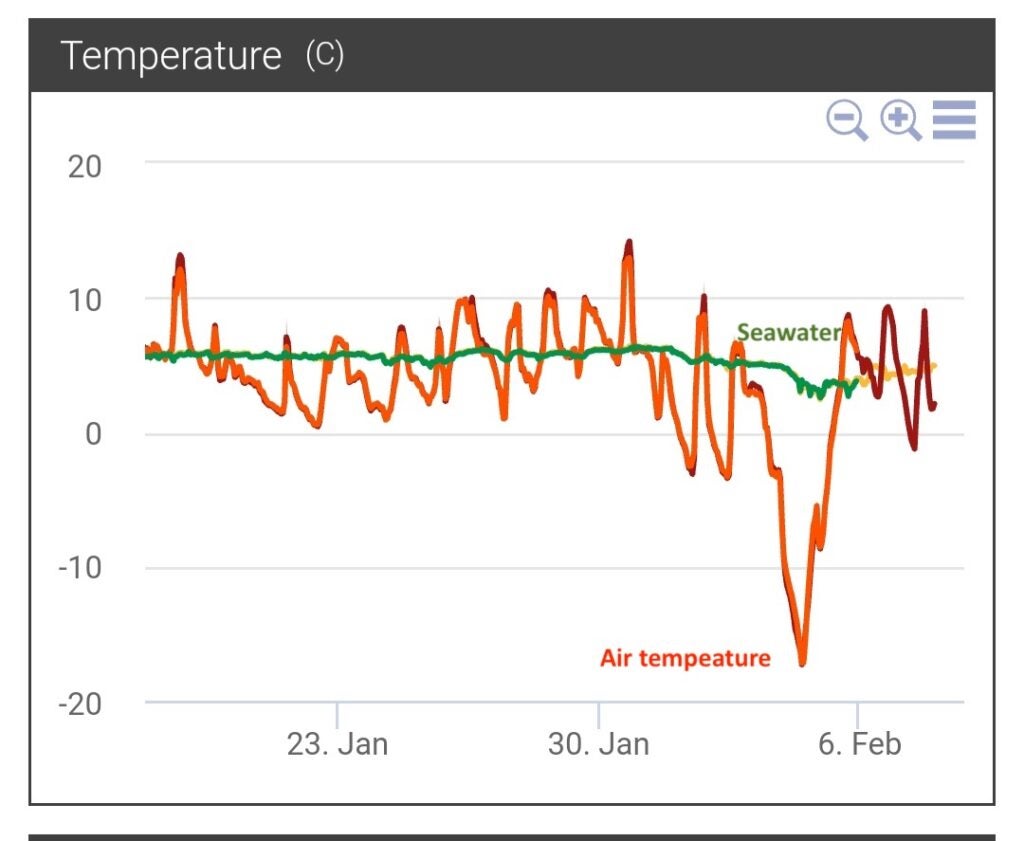
Feb 9, 2023
Our sensor made it through another round of winter storms! Check the temperature drop (from 6°C to -18°C) captured by our in-situ sensor deployed in the Point Judith Kelp Farm!
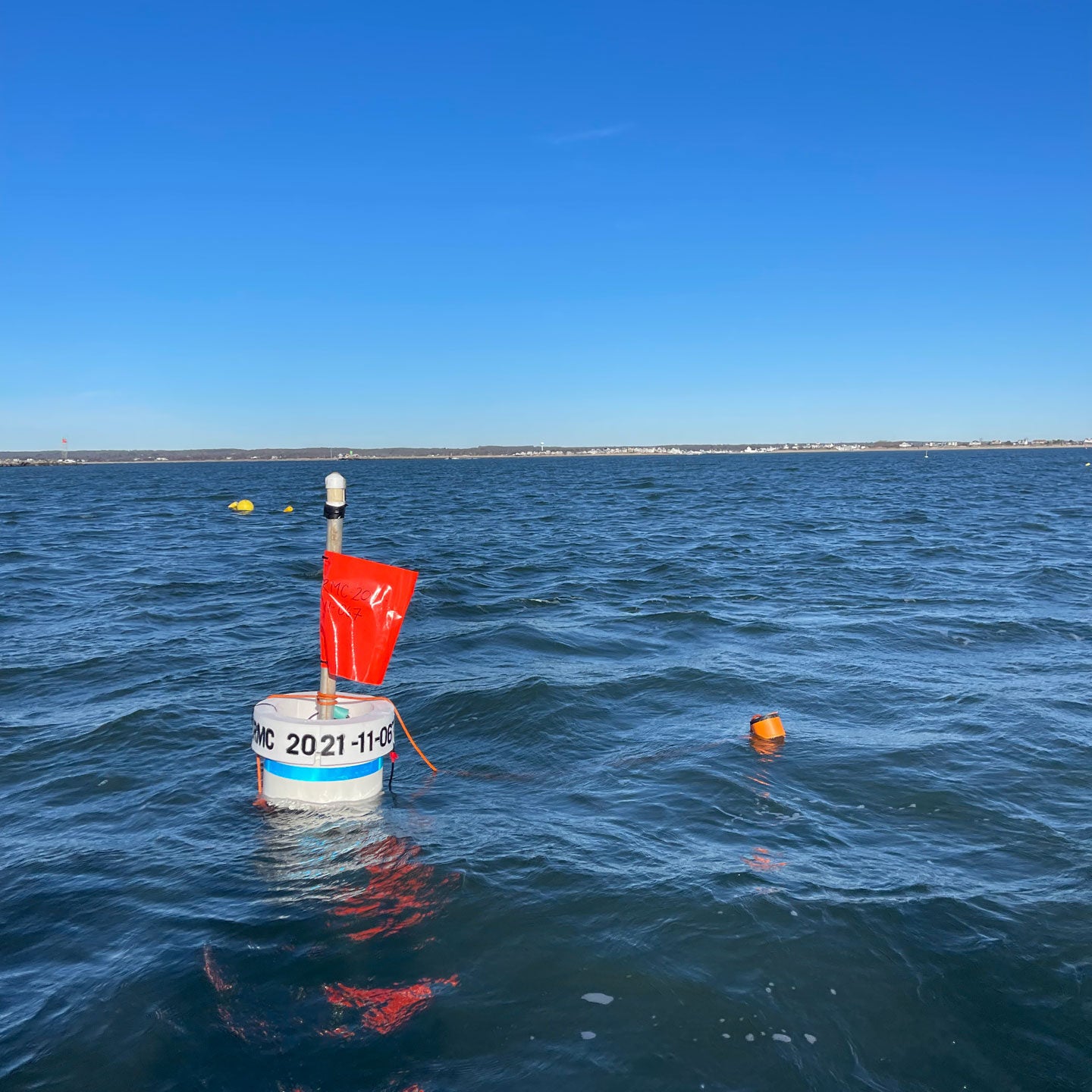
January 17, 2023
With support from Equipment Development Laboratory, Hongjie, Fiona, and Captain Blaney deployed the second set of buoys inside the Kelp Farm to start monitoring the carbon chemistry change along the kelp growth.
January 2, 2023
Wang et al. paper entitled “Simulated Impact of Ocean Alkalinity Enhancement on Atmospheric CO2 Removal in the Bering Sea” is published in the journal Earth’s Future. Link here: https://agupubs.onlinelibrary.wiley.com/doi/10.1029/2022EF002816
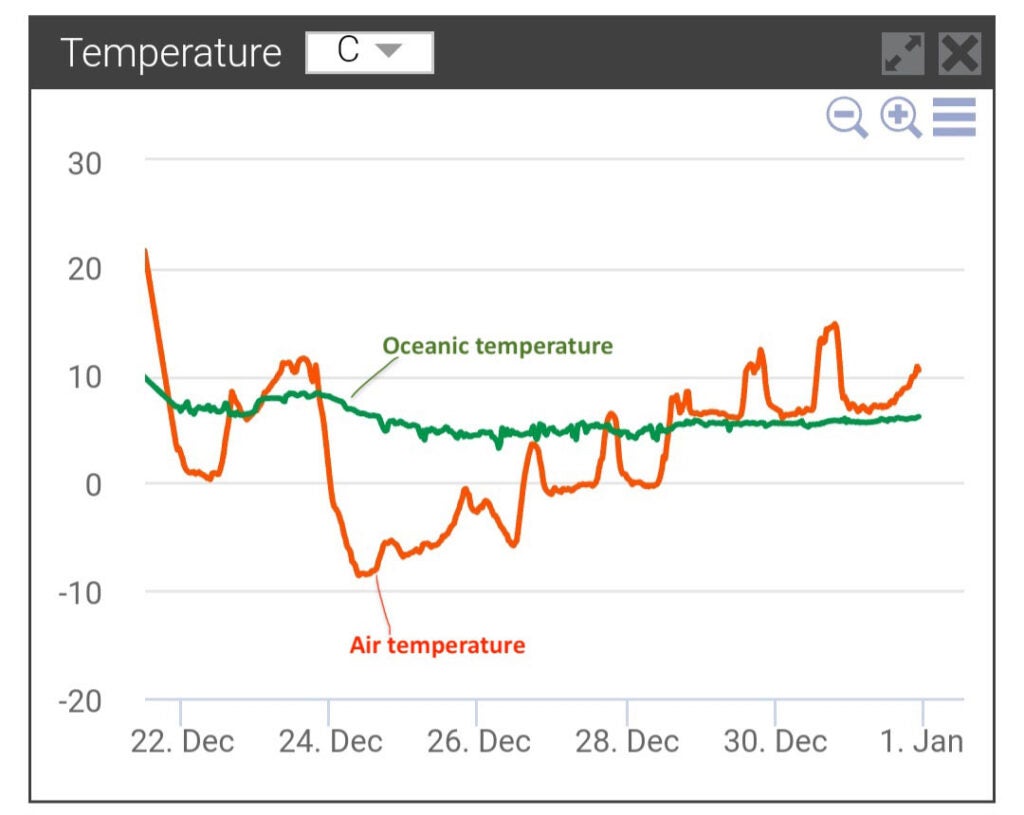
December 24, 2022
The buoy survived the winter storm! Check the air and water temperature change along the storm!
December 21, 2022
Big thanks to the Equipment Development Laboratory (Cath Cipolla, Gary Savoie, and Danielle Cares) for providing the machine shop capabilities, help Wang to design and manufacture two customized frames to secure the sensor package to the buoys.
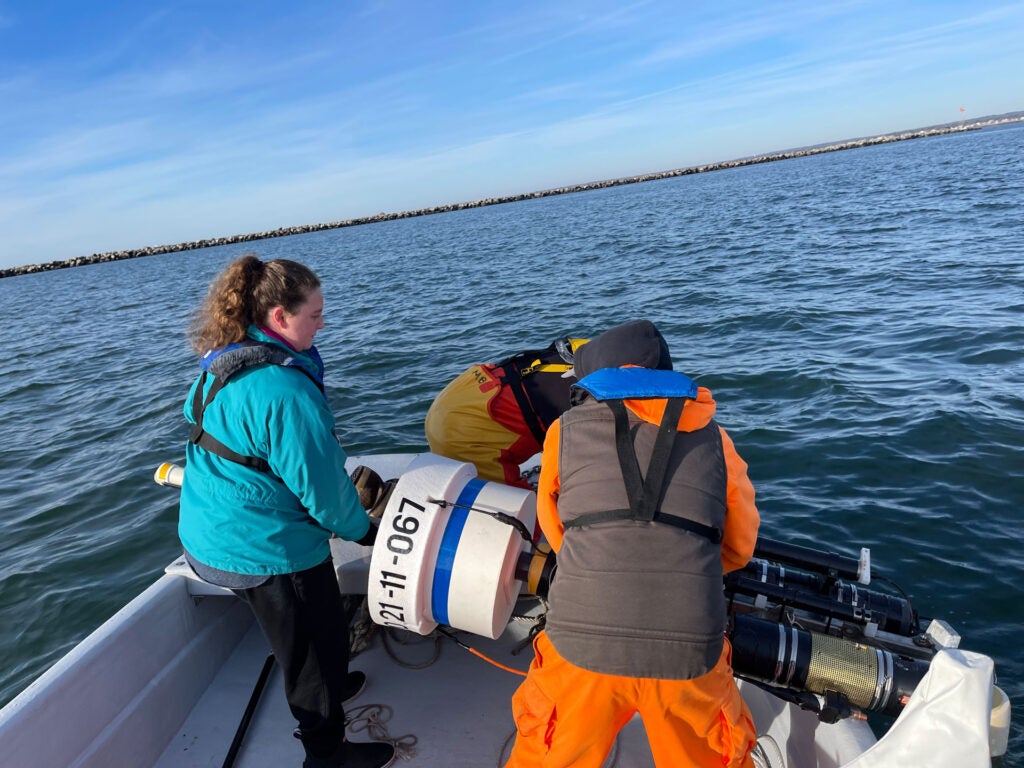
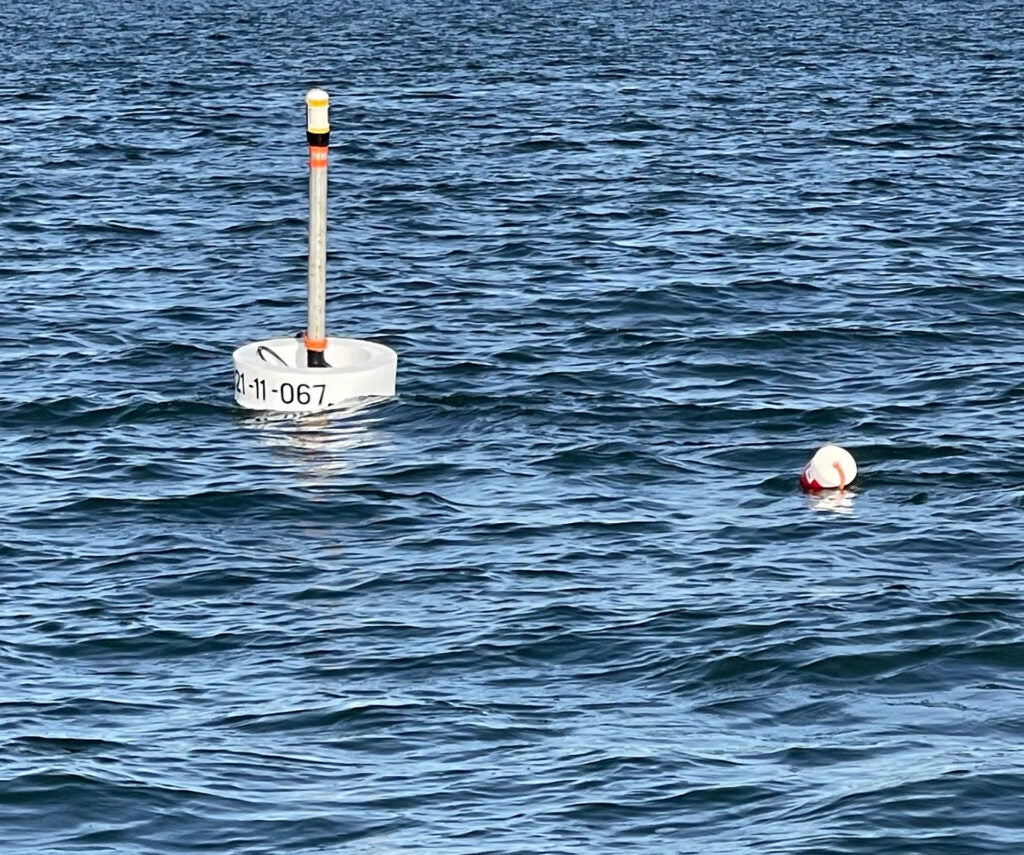
December 13, 2022
Congratulations to Wang lab for being funded by Bigelow Laboratory and USDA to Evaluate the Potential Ocean Acidification Mitigation Effects From Sugar Kelp Growth in Rhode Island. https://www.bigelow.org/news/articles/2022-12-13.html
Nov 9, 2022
Big thanks to Dr. Kristofer Gomes, Ms. Ruby Dener and Emma, We have successfully retrieved the SeapHOx sensor after two months of deployment in Narragansett Bay! During this two-month deployment, the surface sensor captured fine-scale changes resulting from tidal mixing, freshwater input, and biological processes. Here is a screenshot showing the high-resolution pH drop from 7.8 to 7.5 after the precipitation in early November.

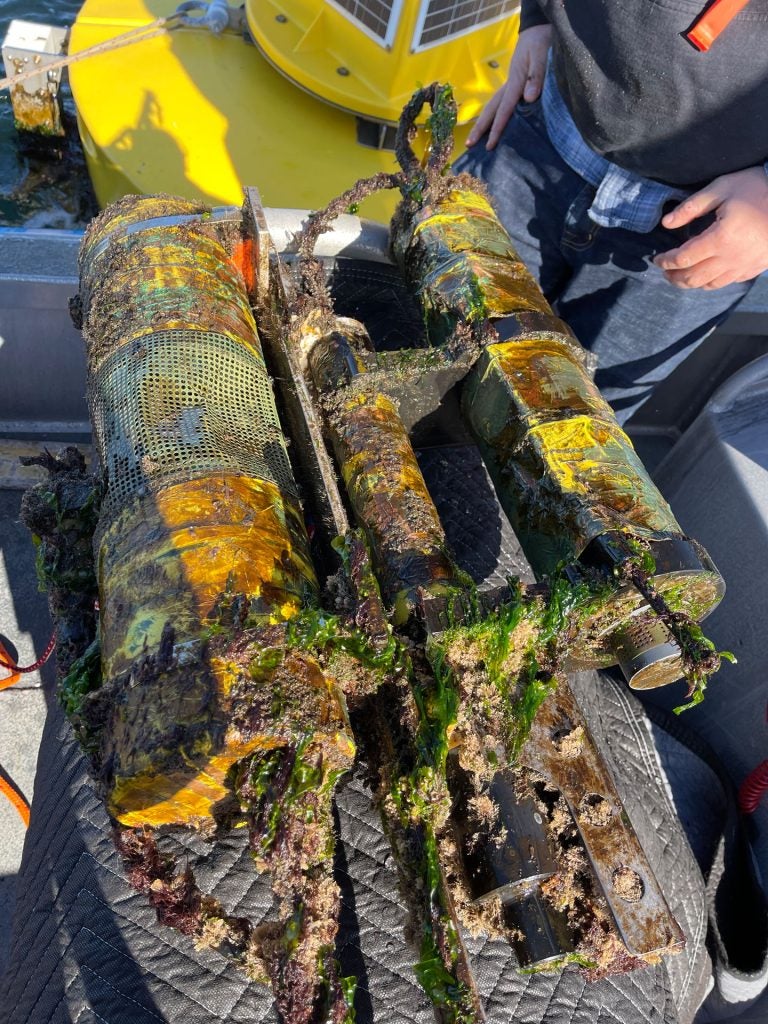
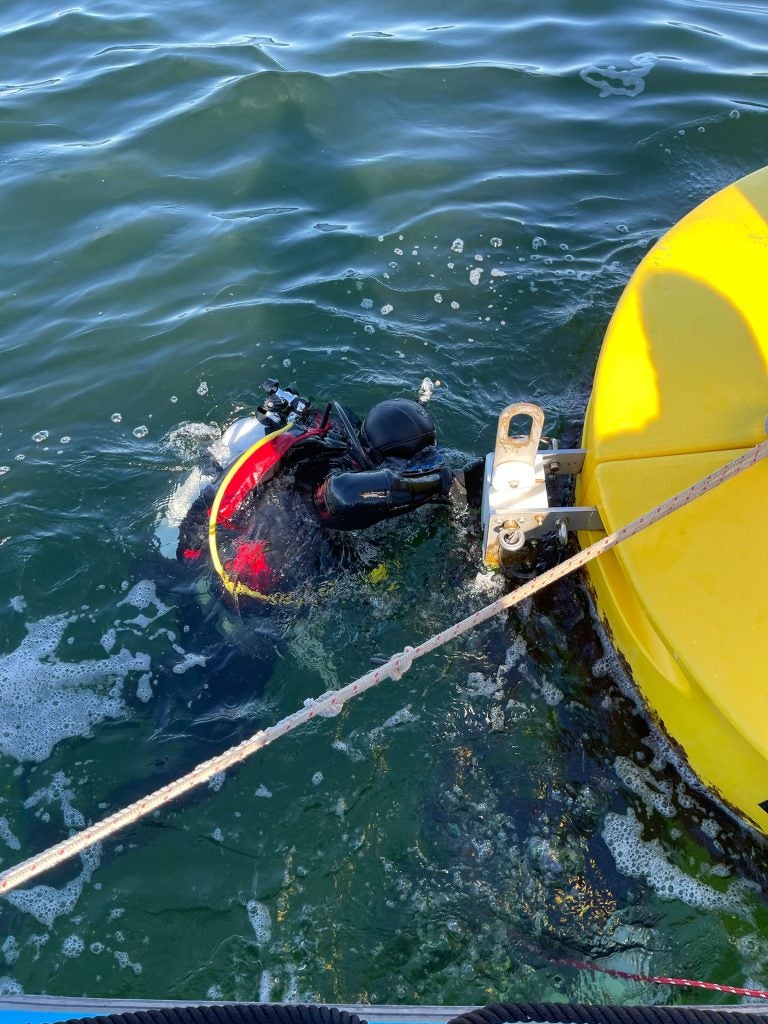
September 9, 2022
One set of SAMICO2 and SeapHOx has been successfully deployed in upper Narragansett Bay with support from Prof. Andy Davies, Dr. Kris Gomes, and the diver team: Ms. Ruby Dener and Ms. Jane Carrick ! Outstanding work! Teamwork makes the dream work!
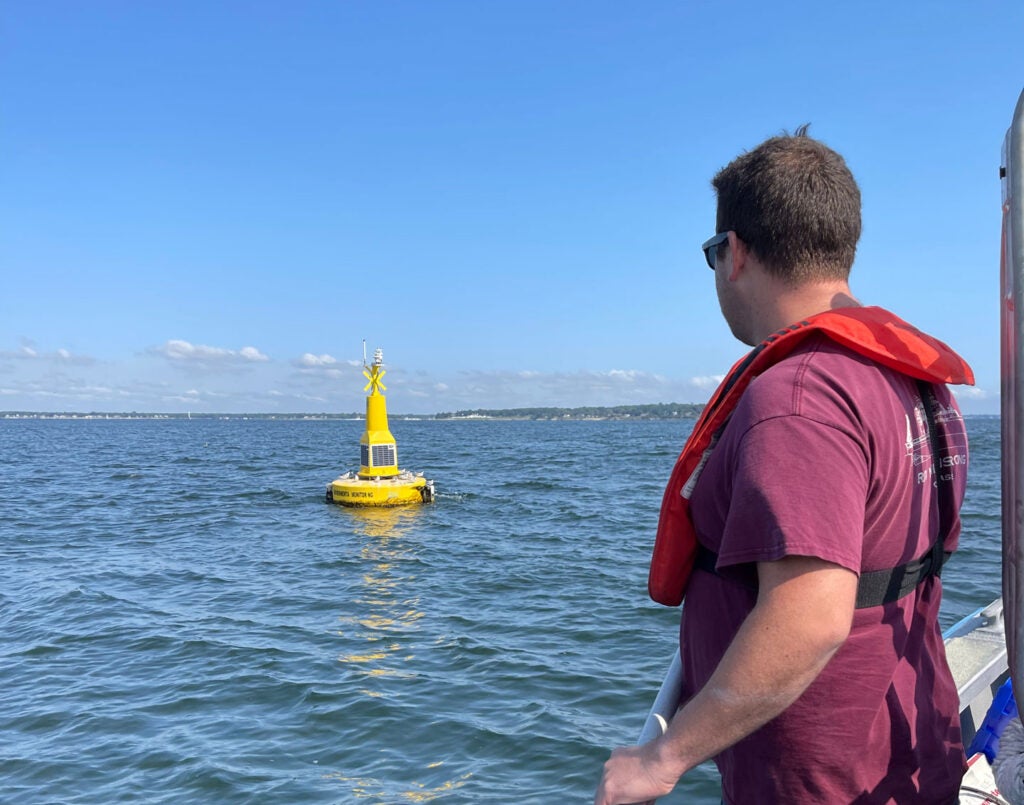
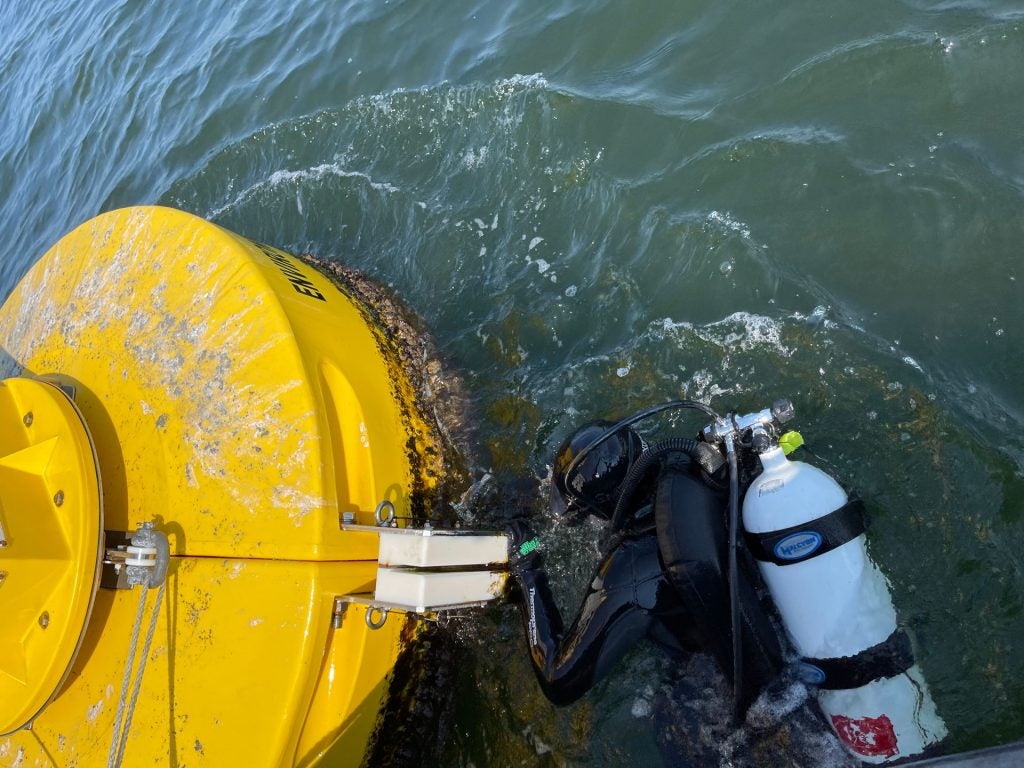
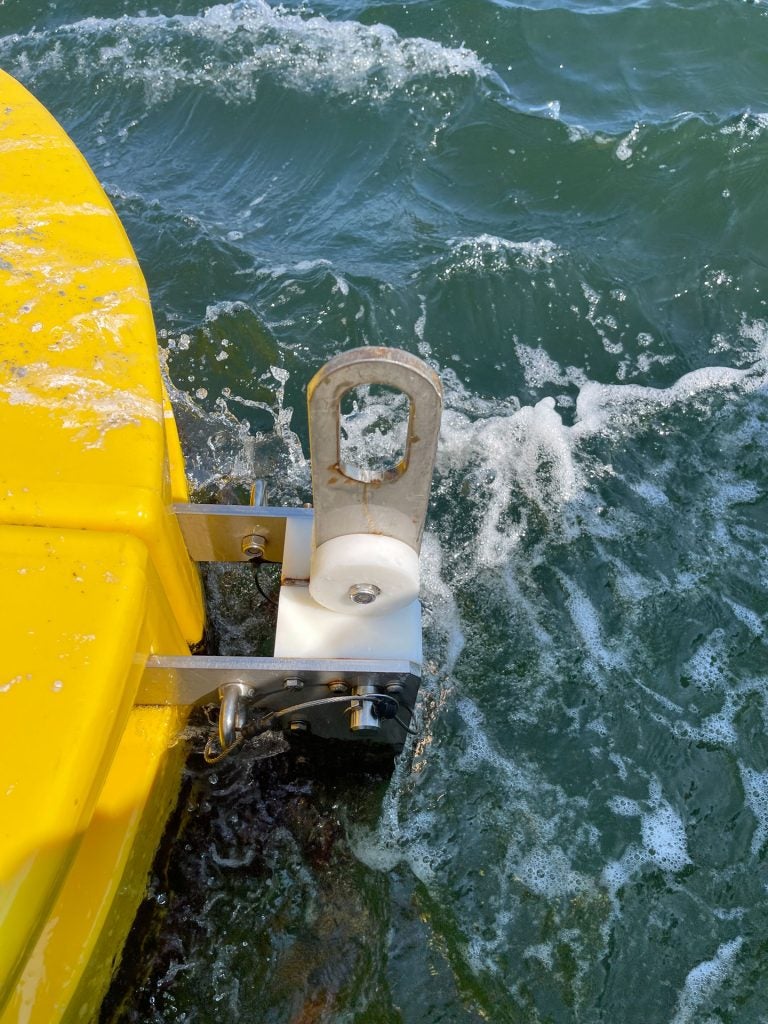
September 2022
Ms. Abigail Baskind joins the ocean carbon lab as a Ph.D student. Welcome!
September 2022
Ms. Fiona Teevan-Kamhawi and Mr. Thomas Caero join the ocean carbon lab as master students. Welcome!
